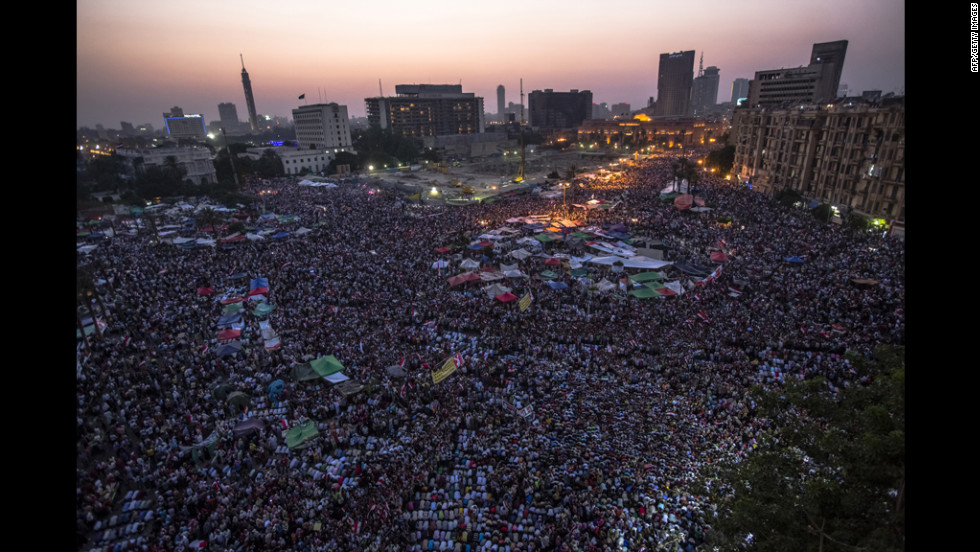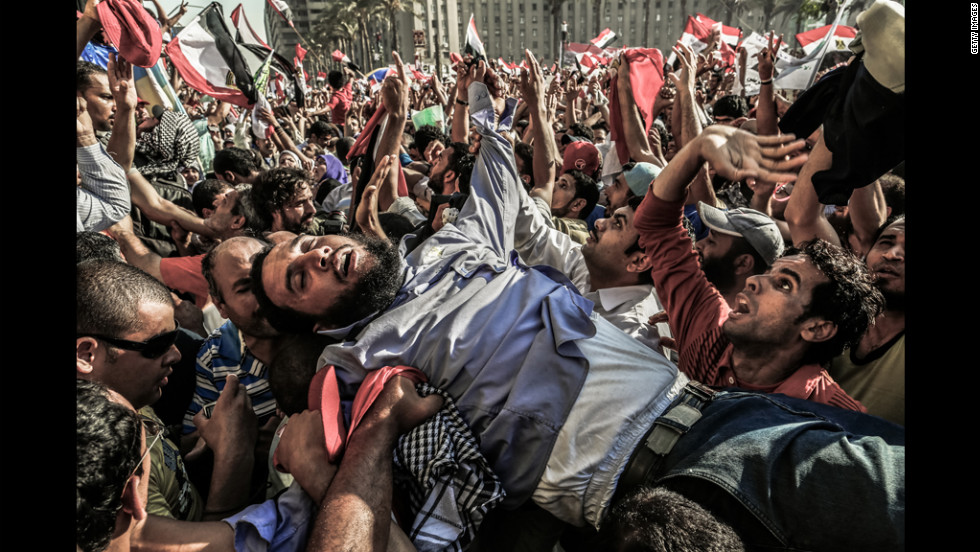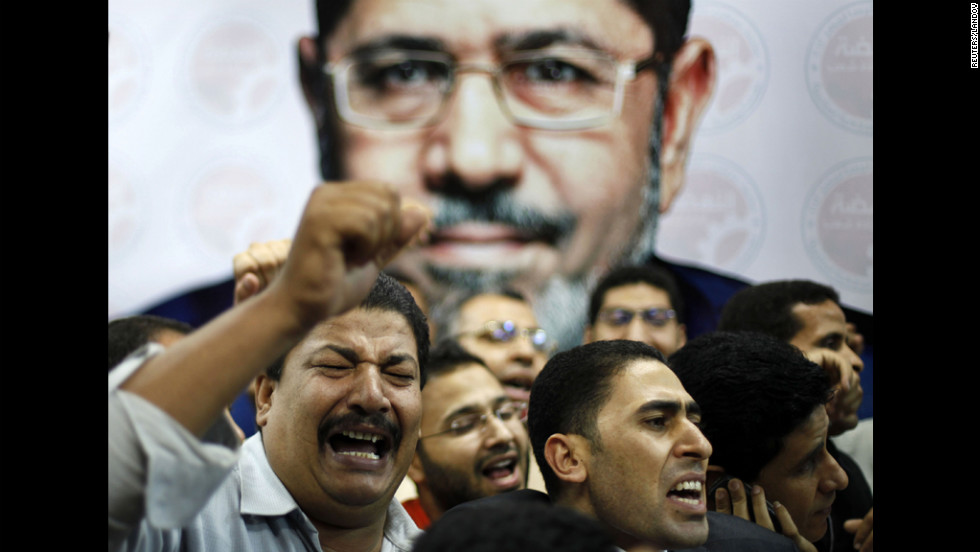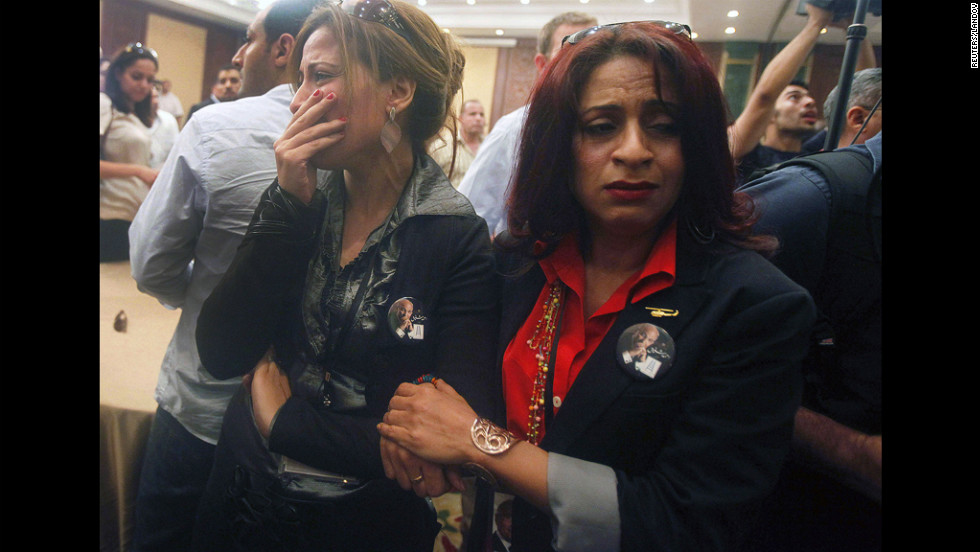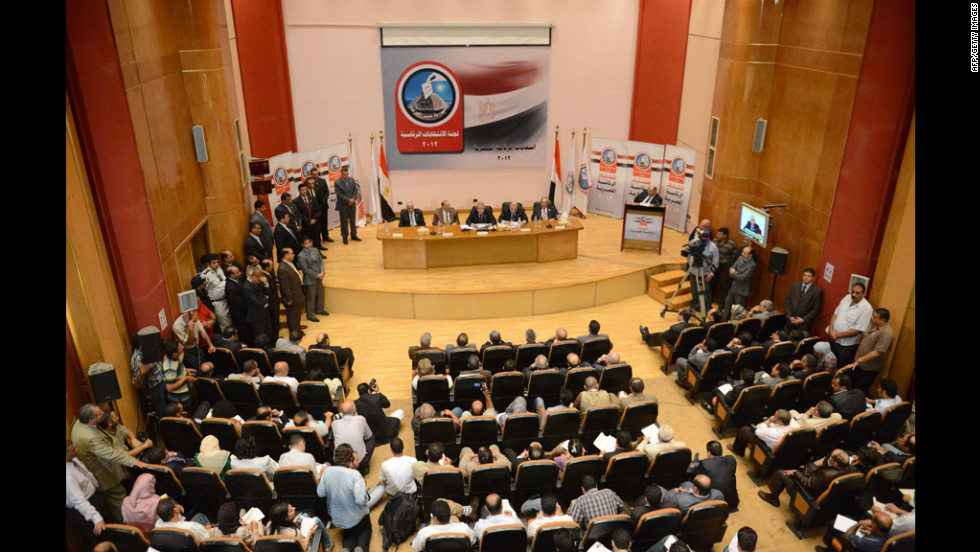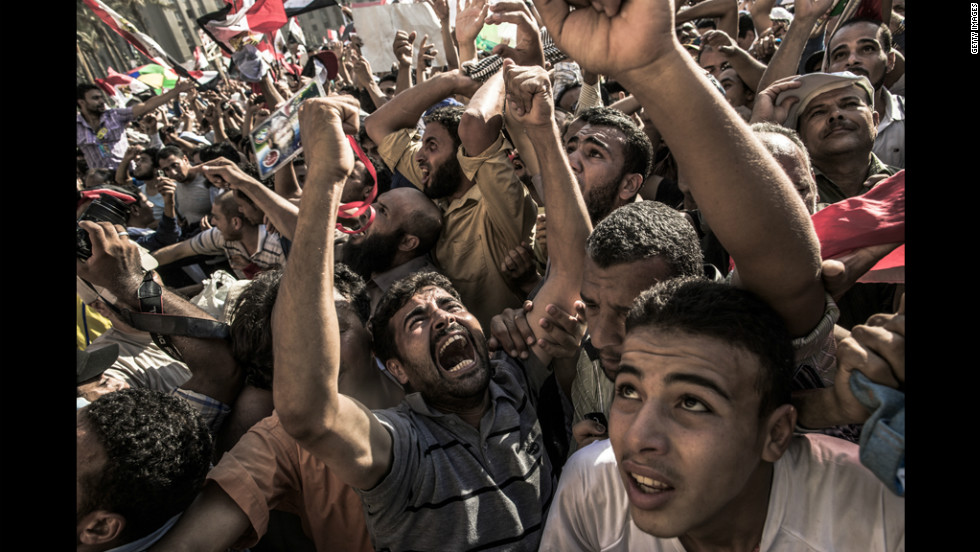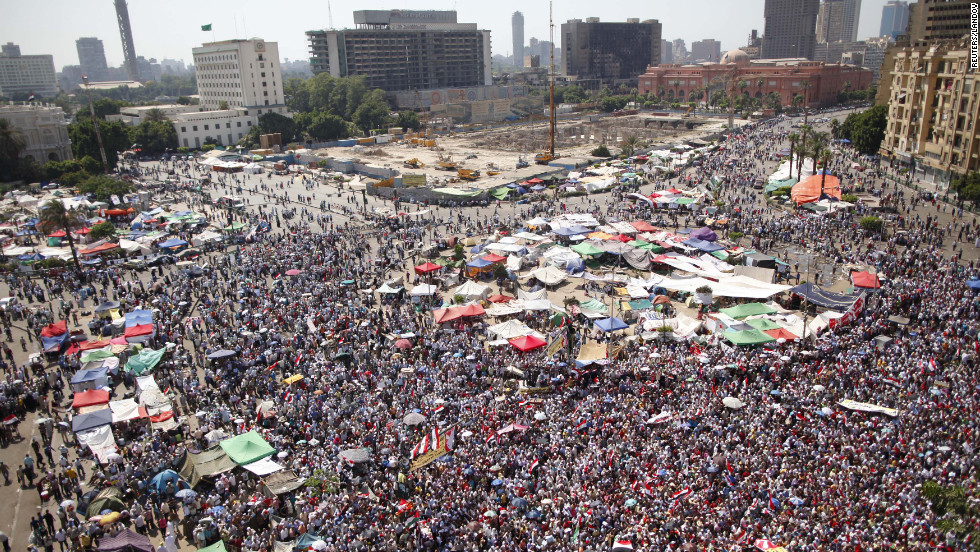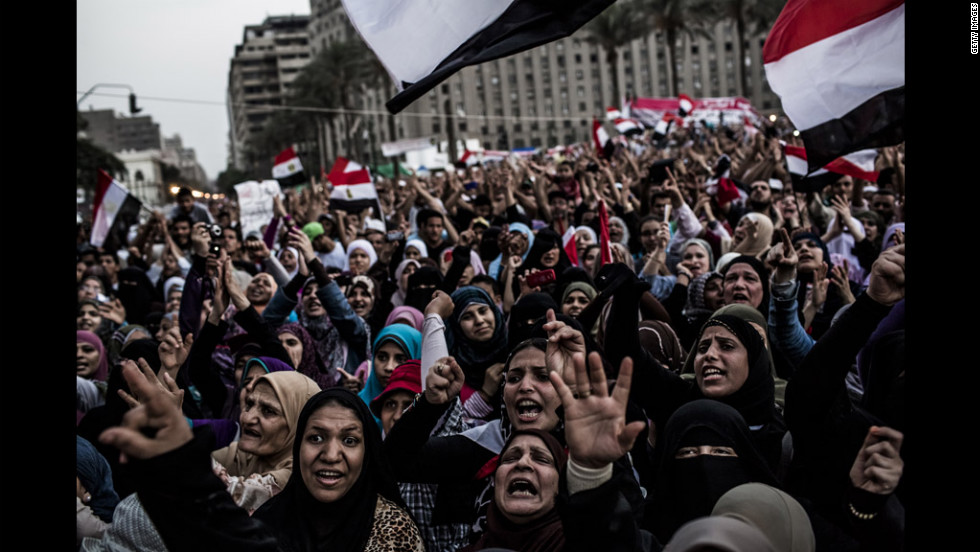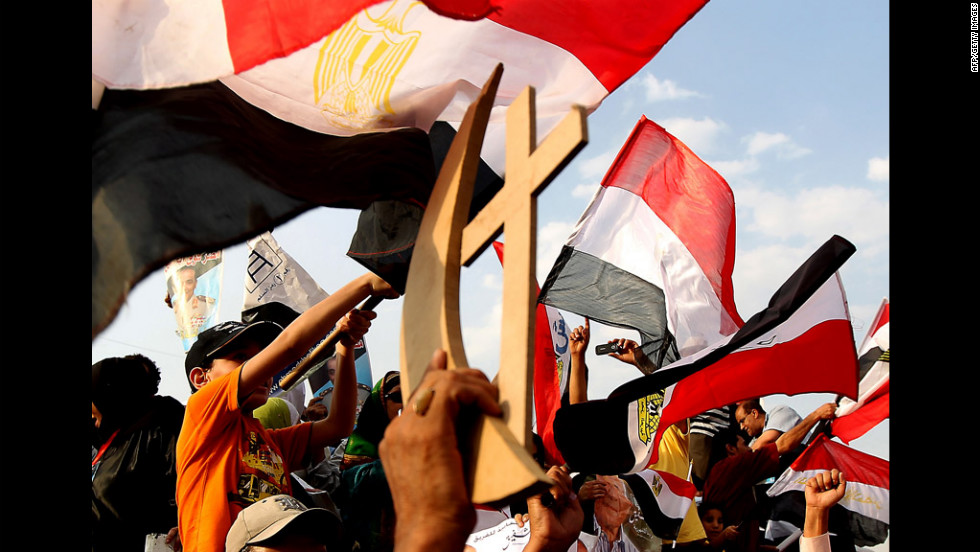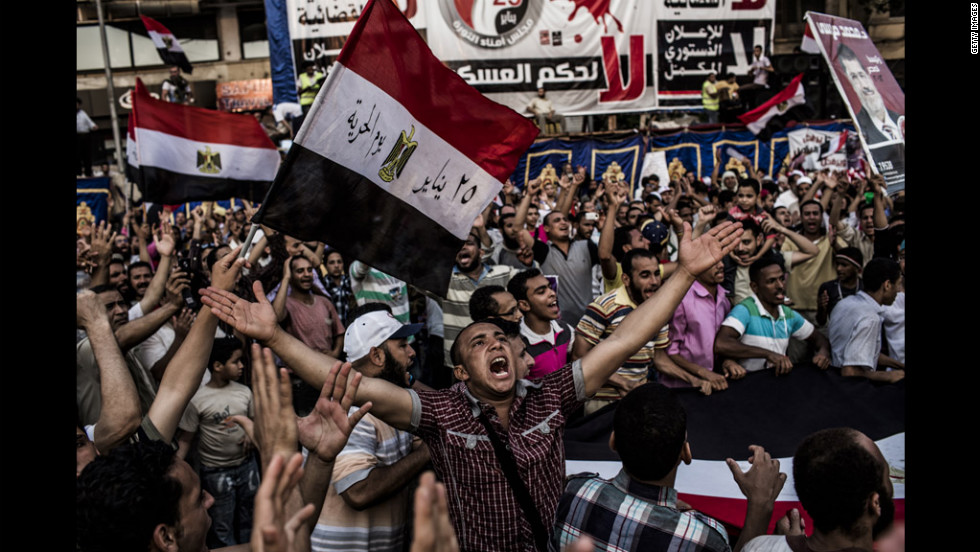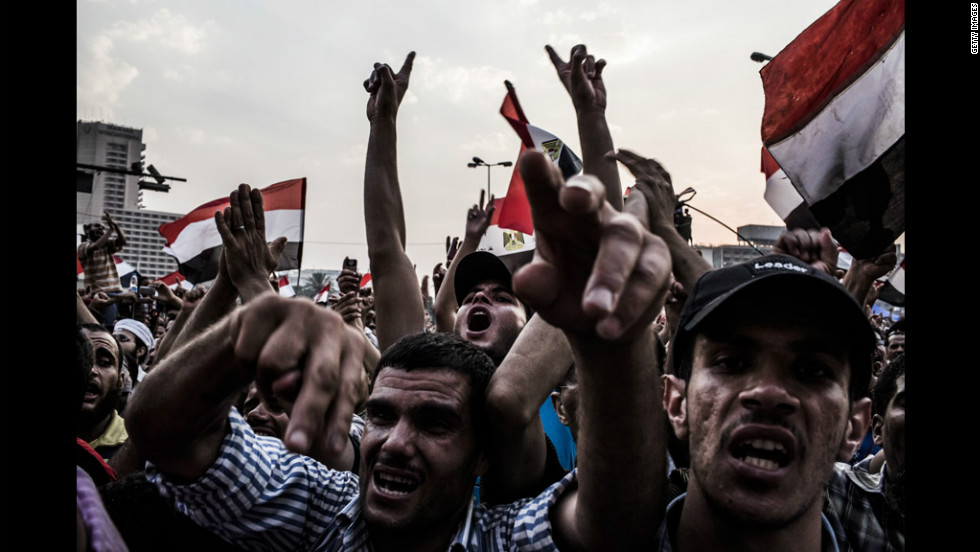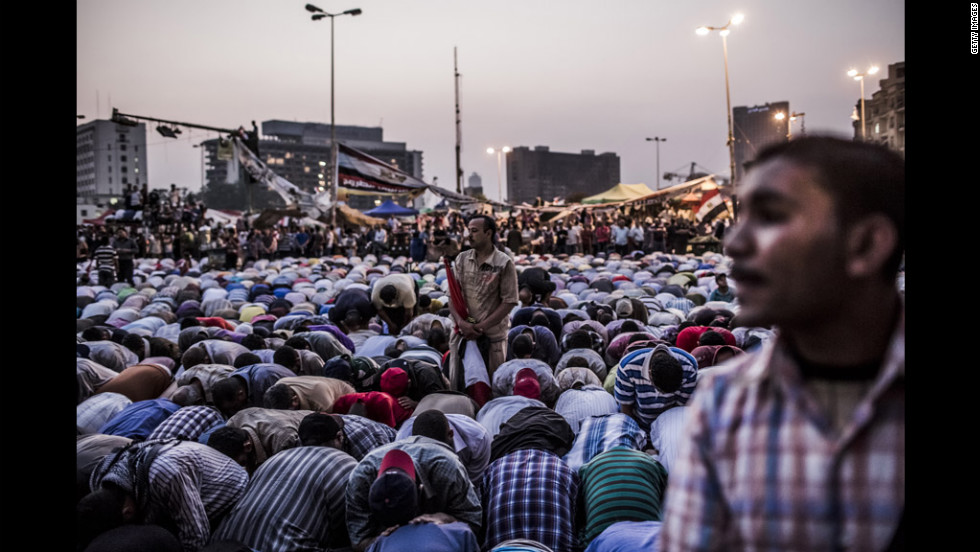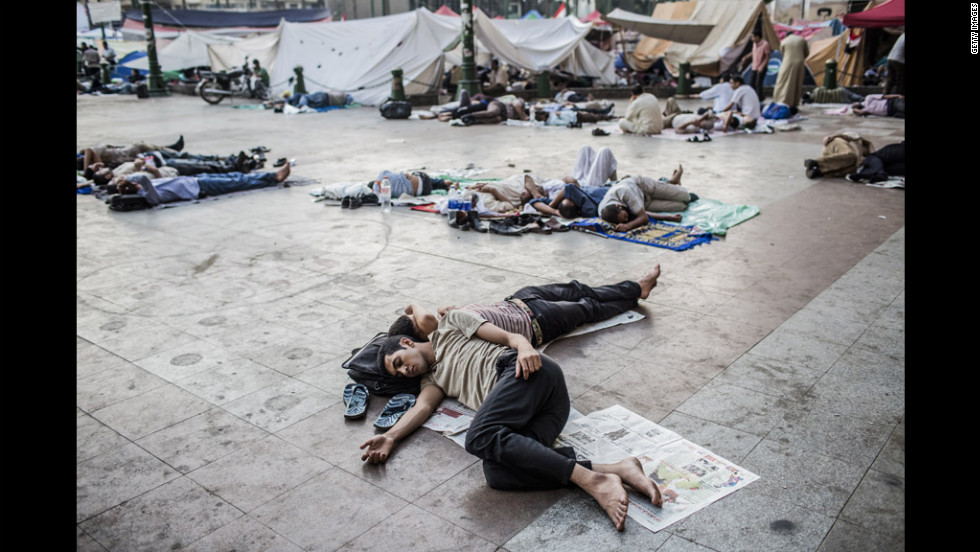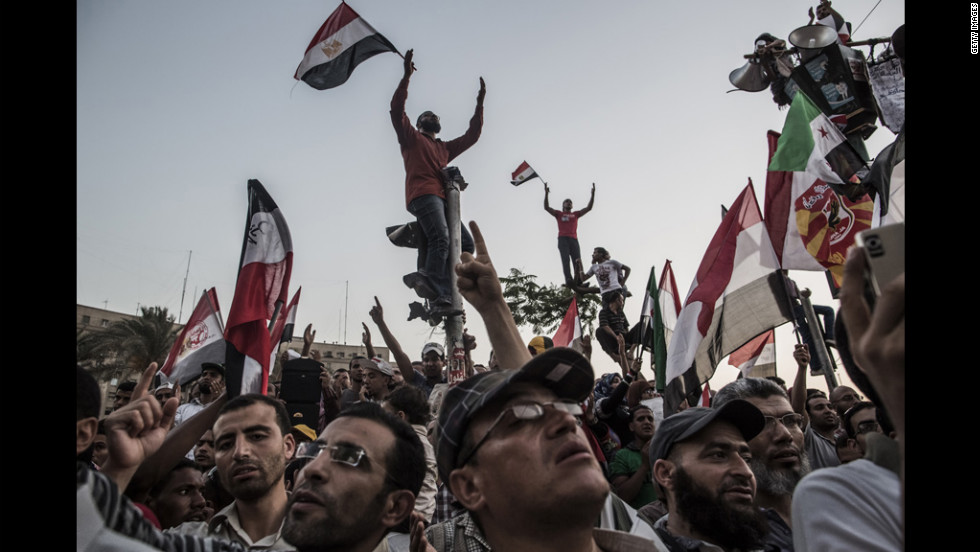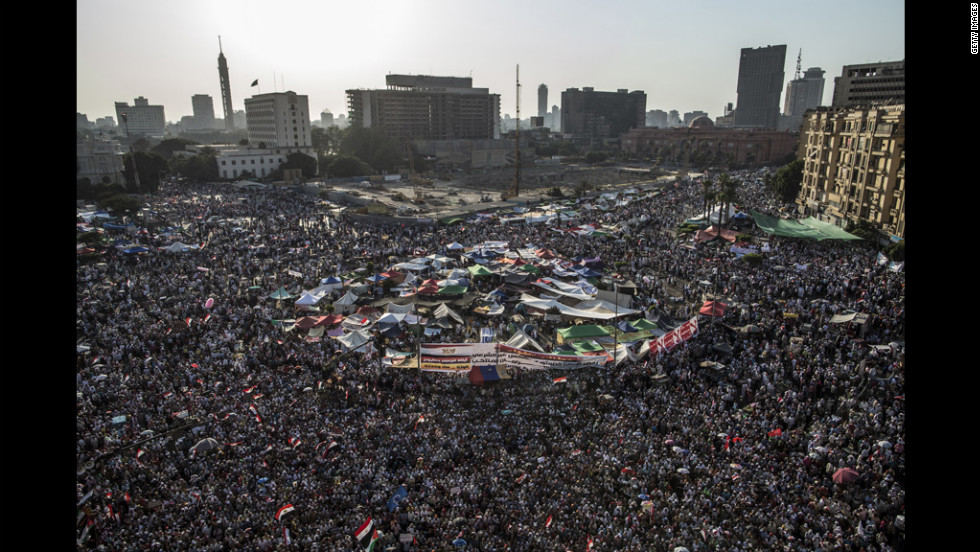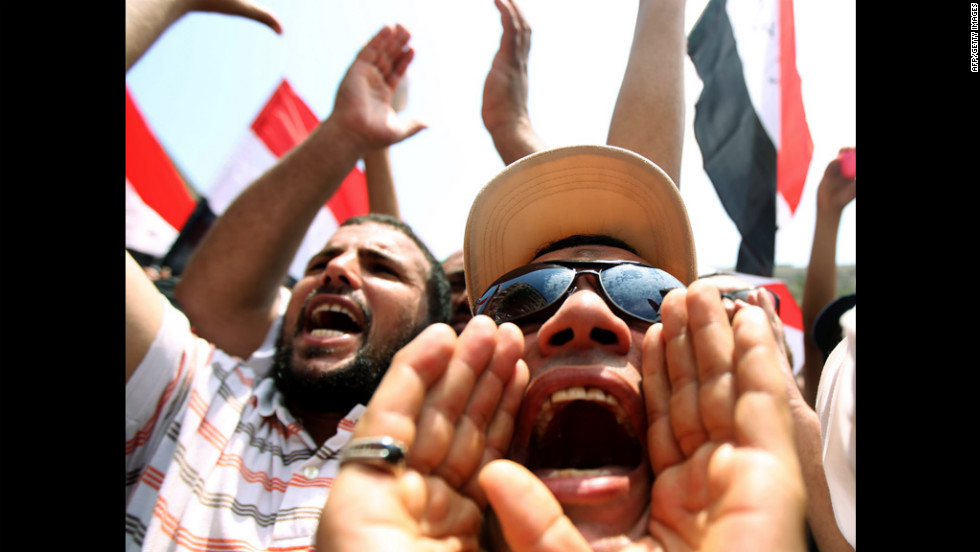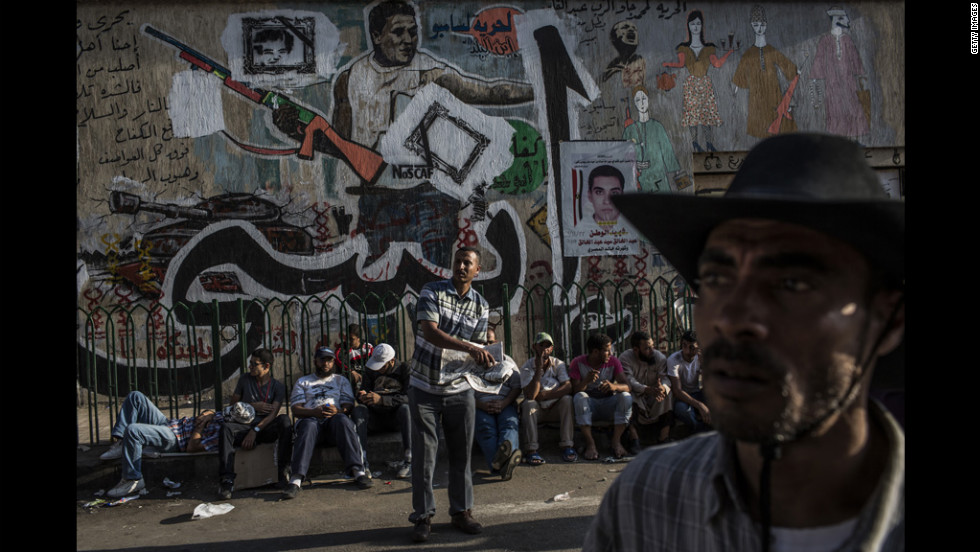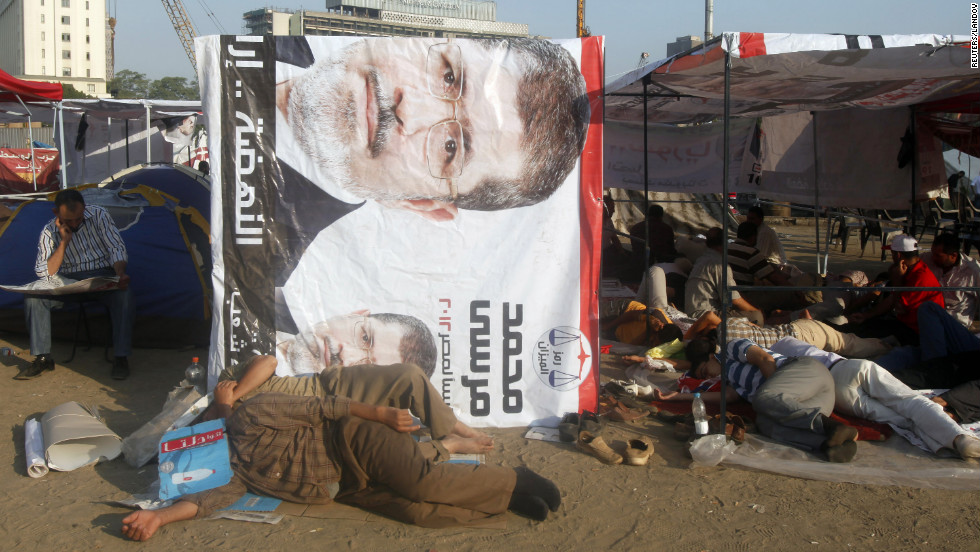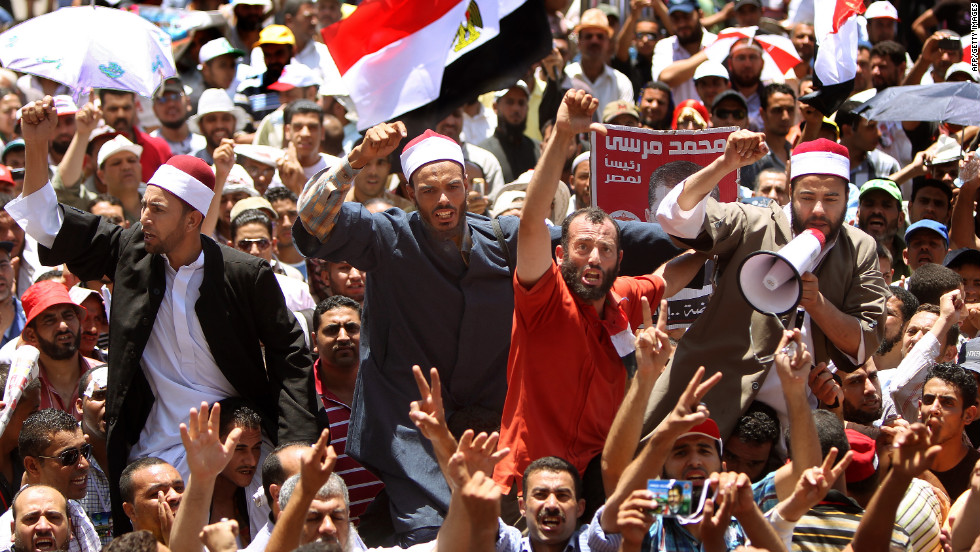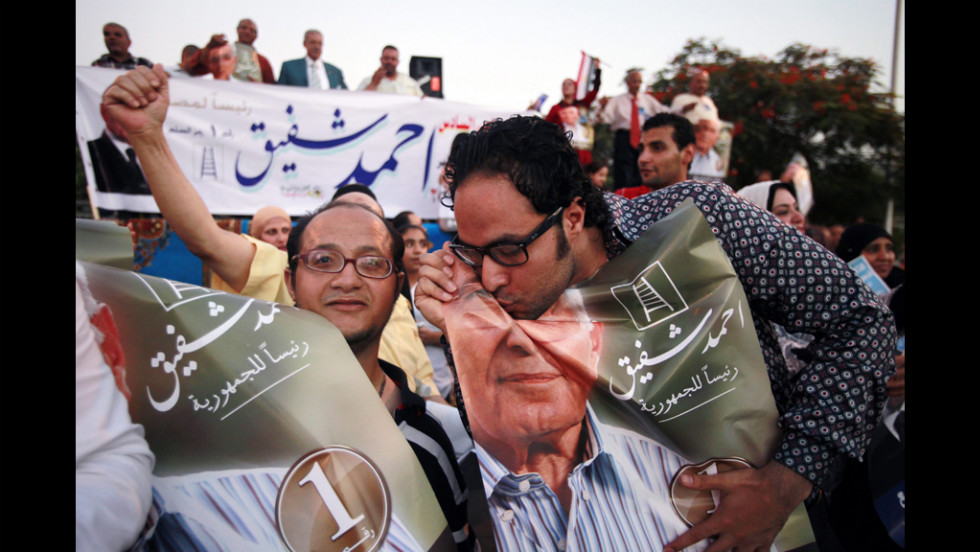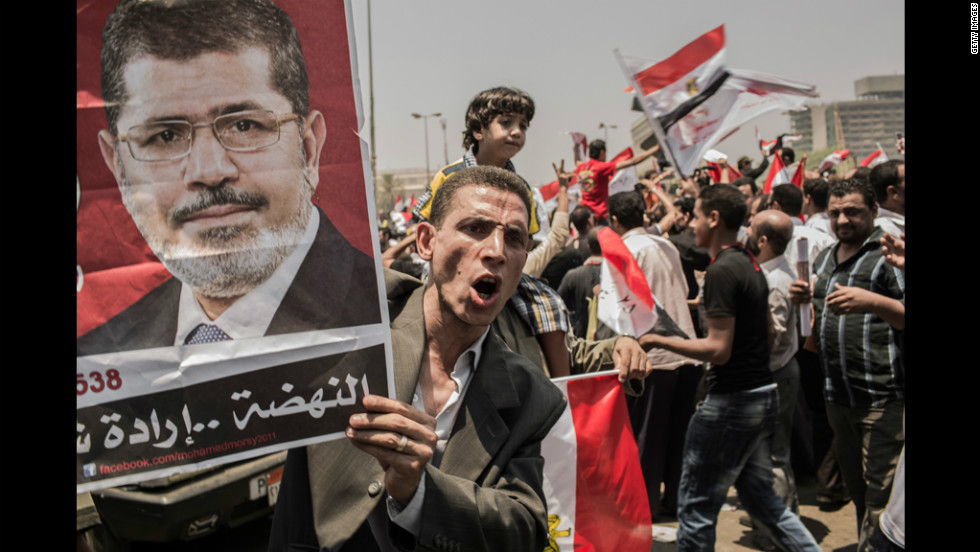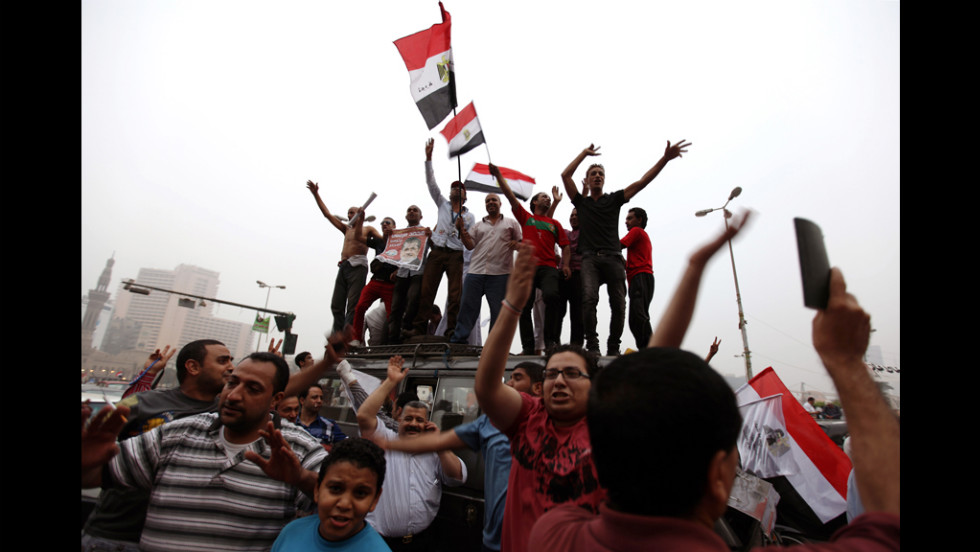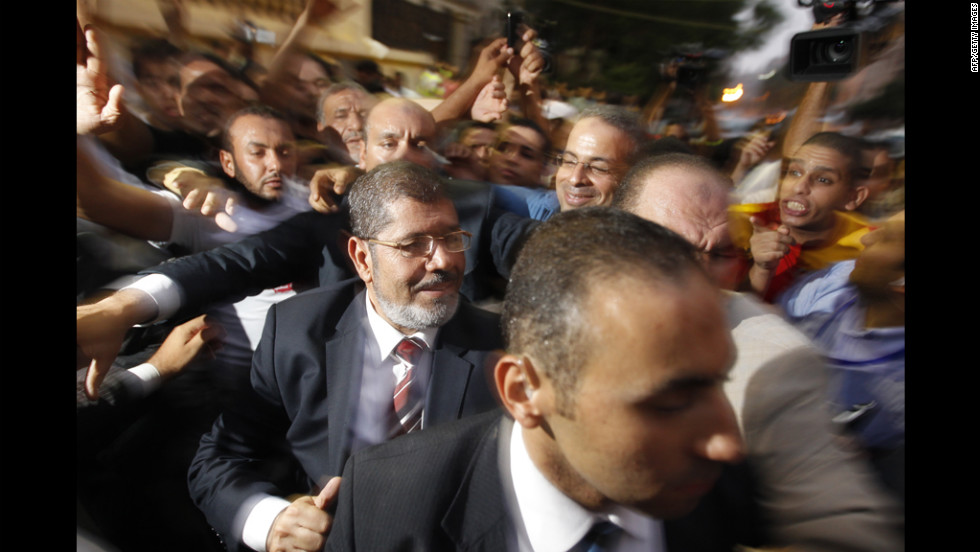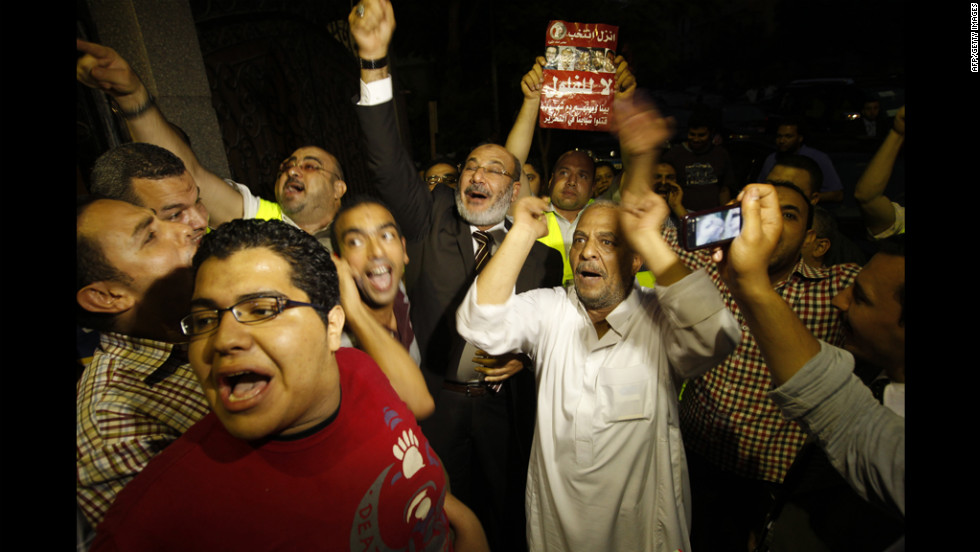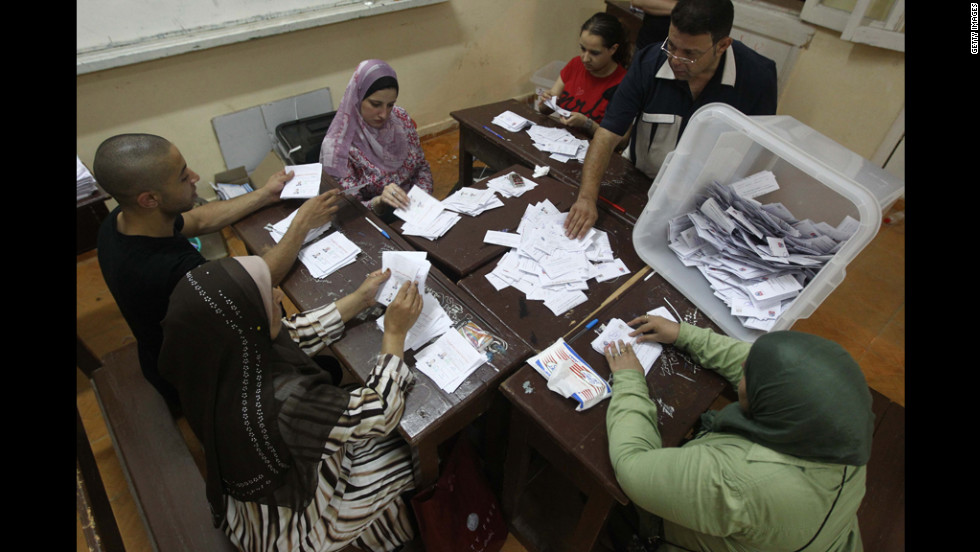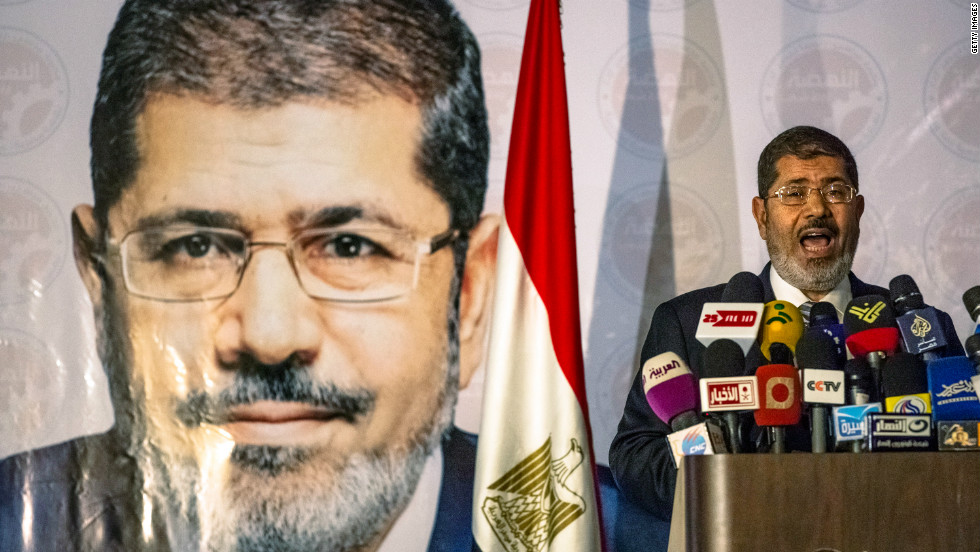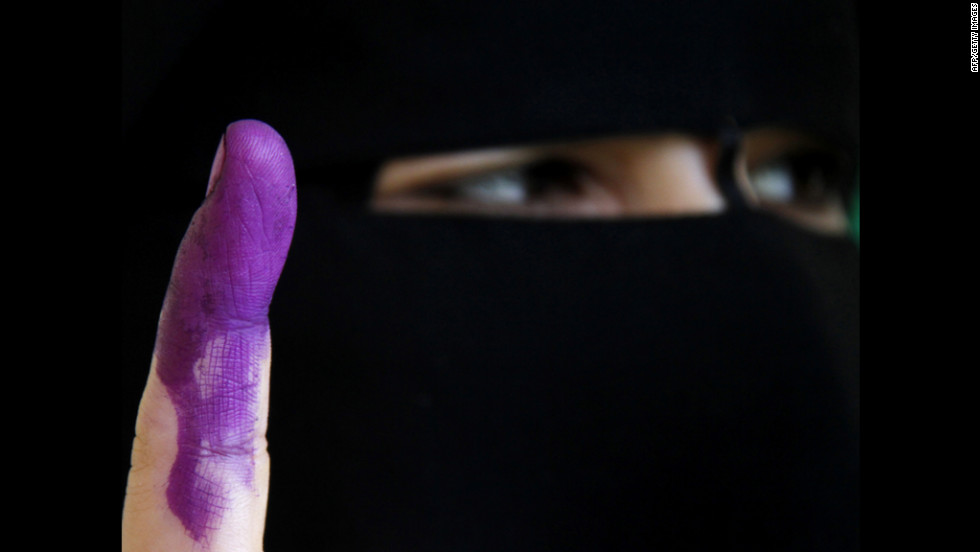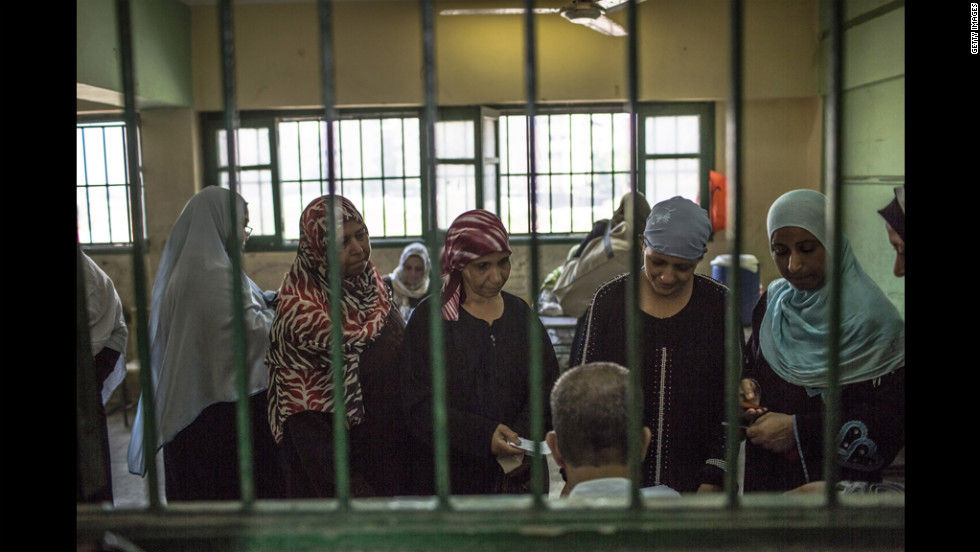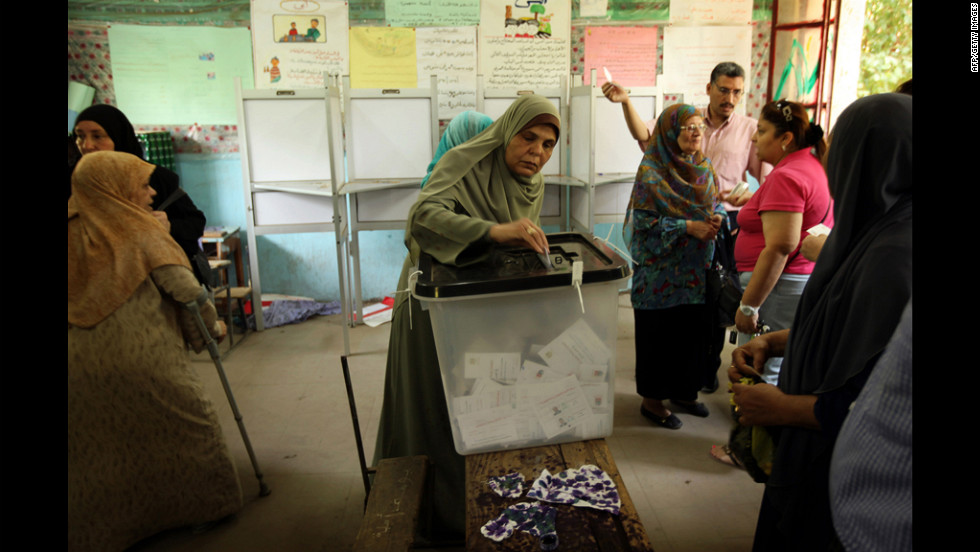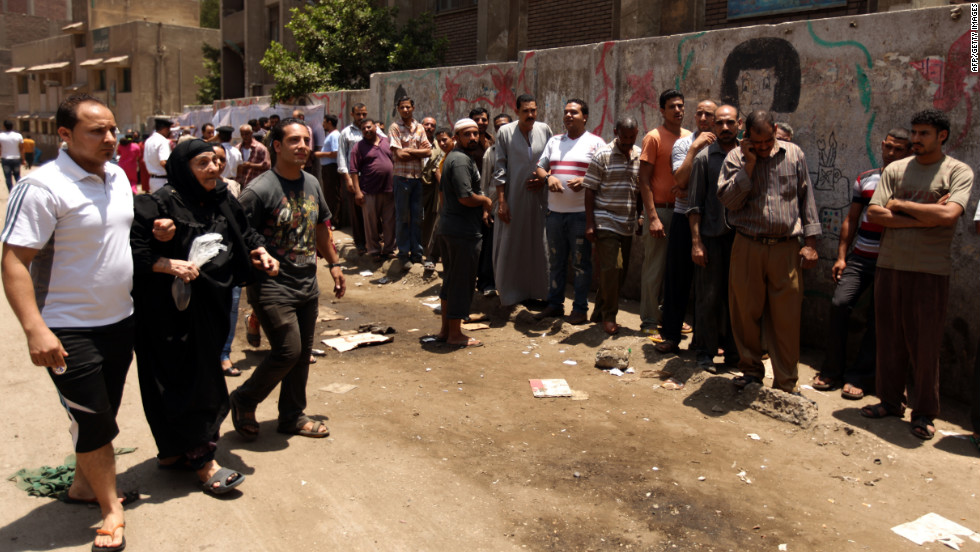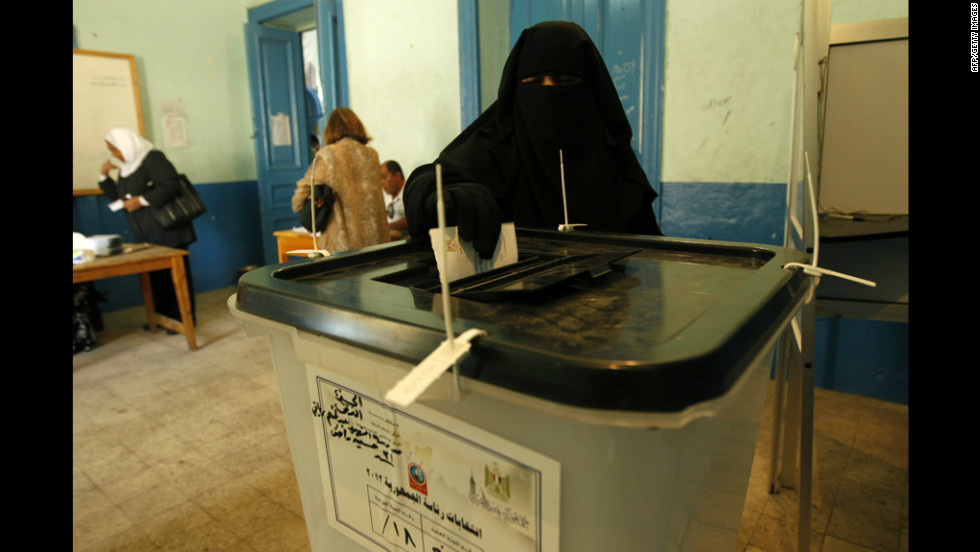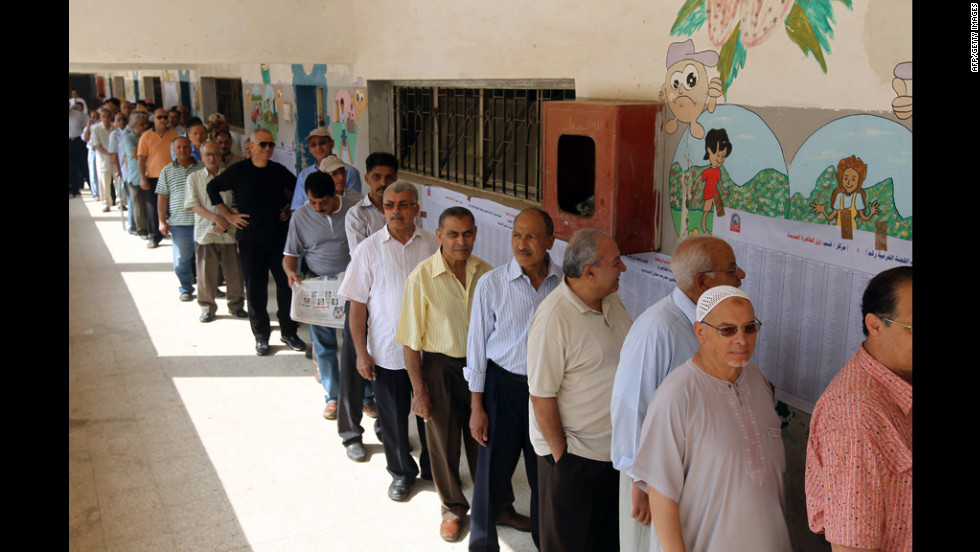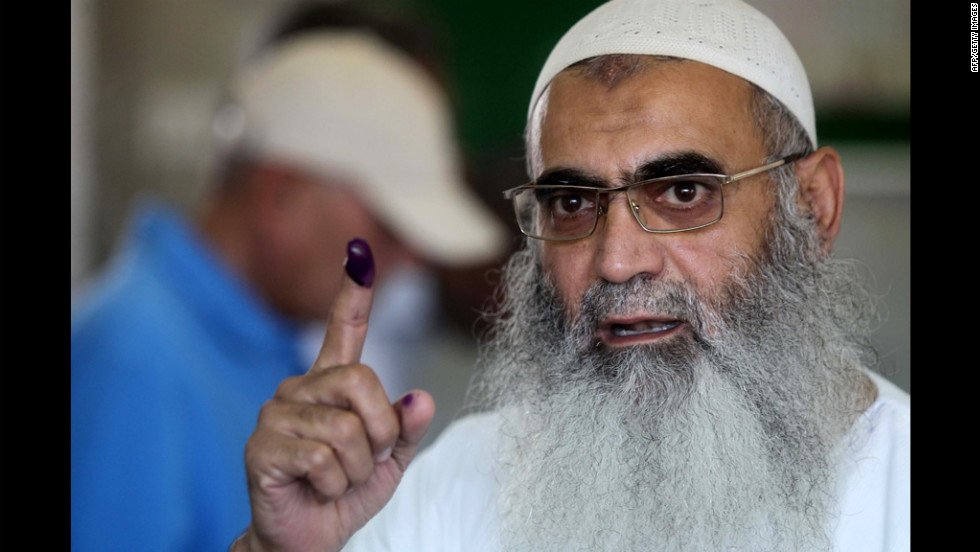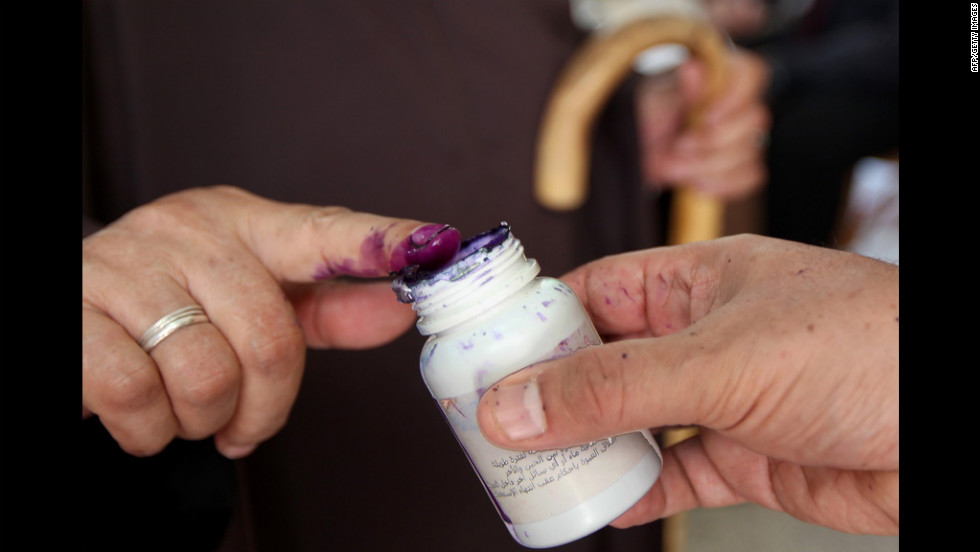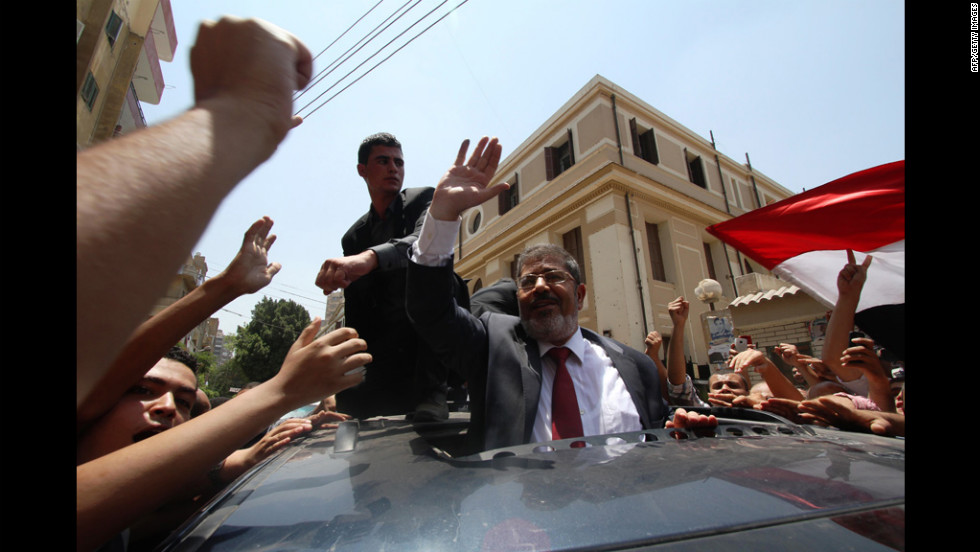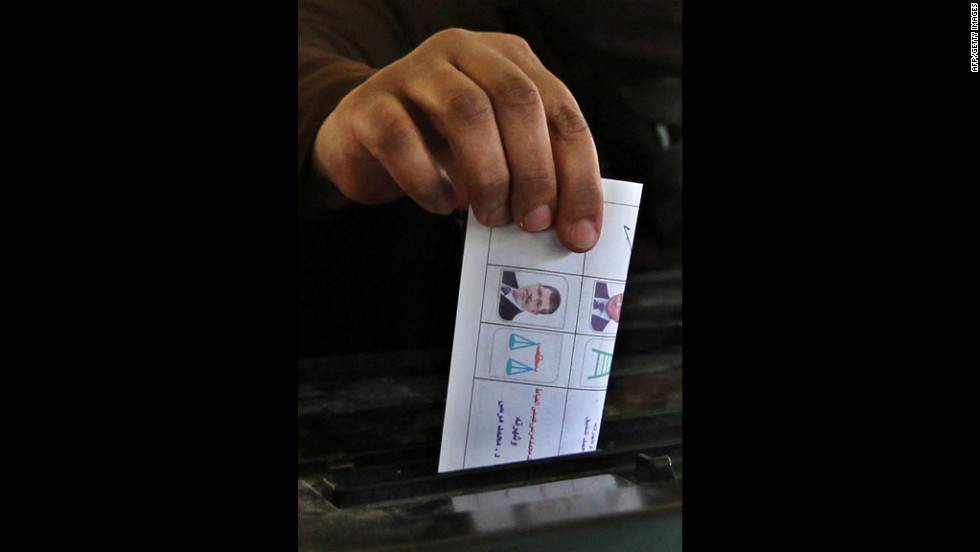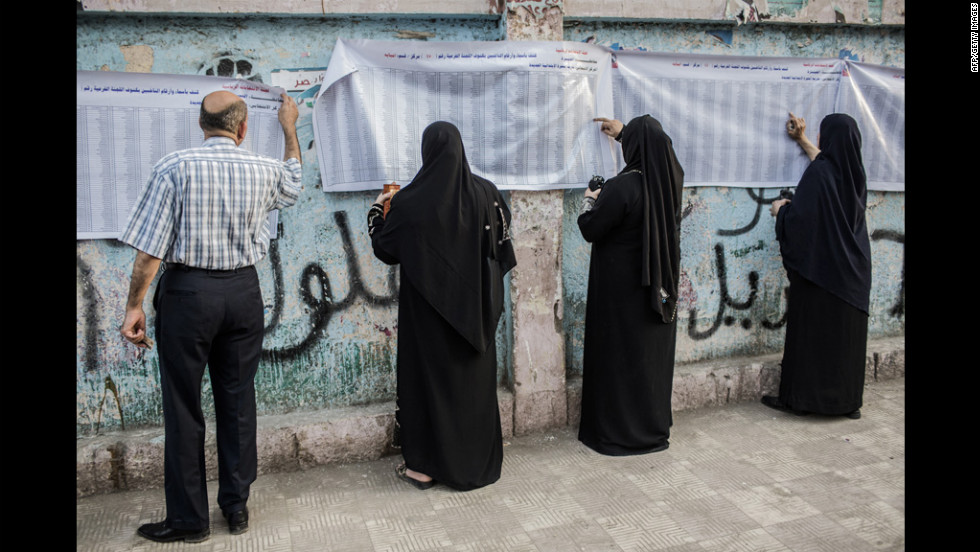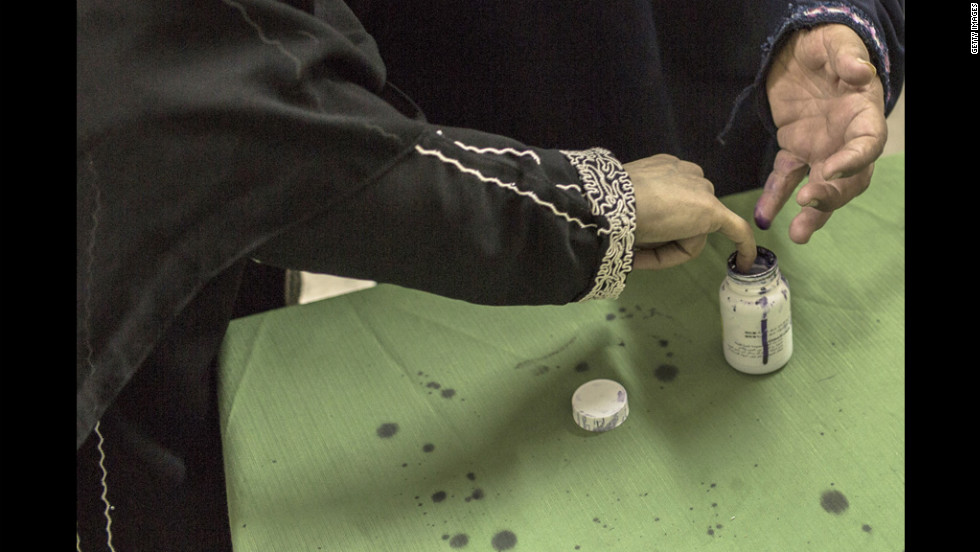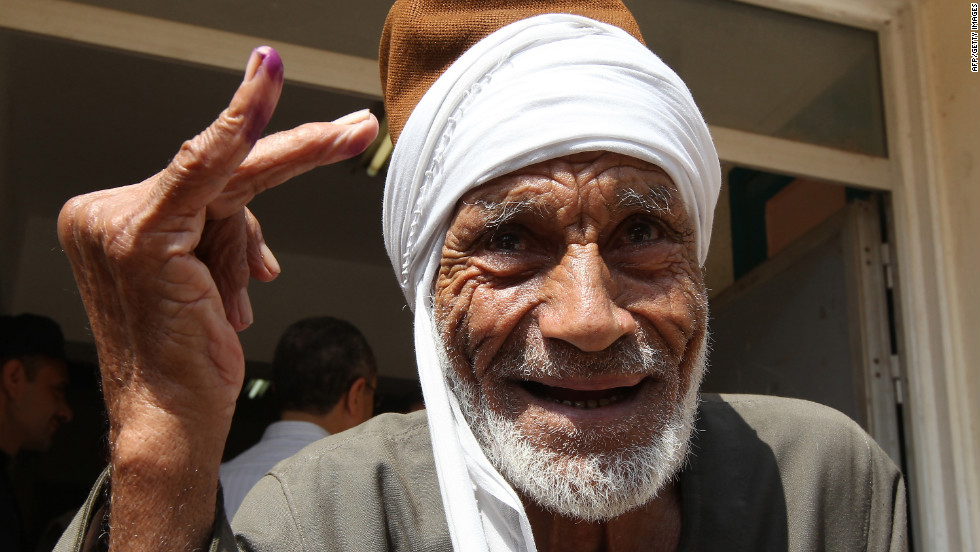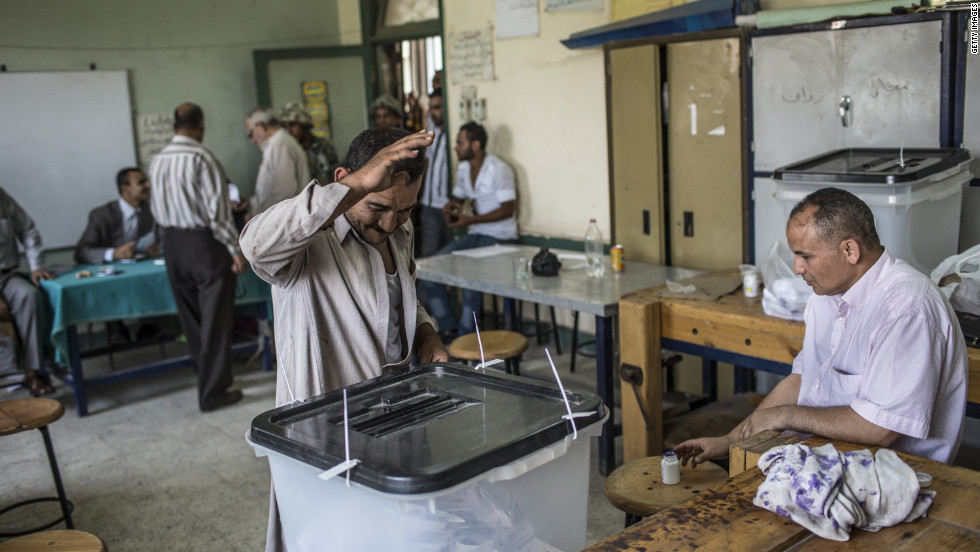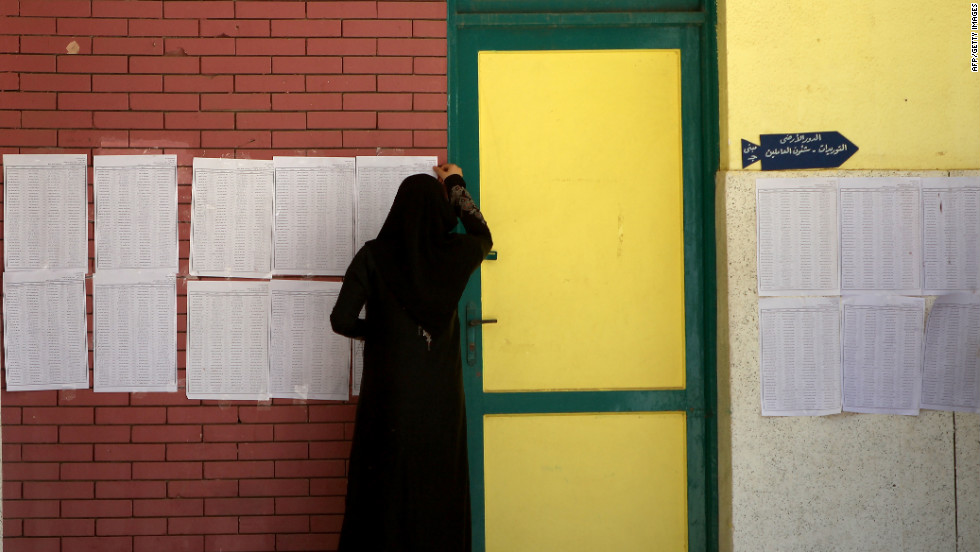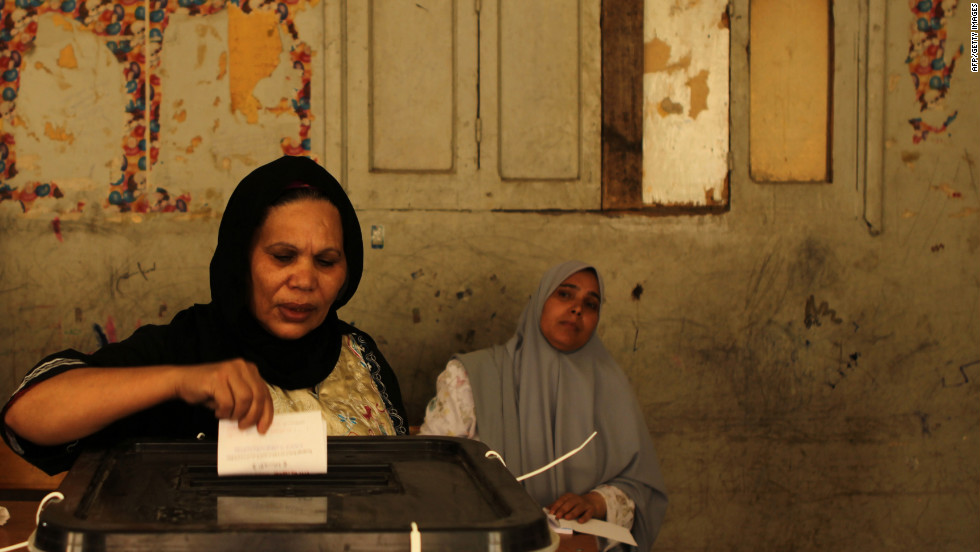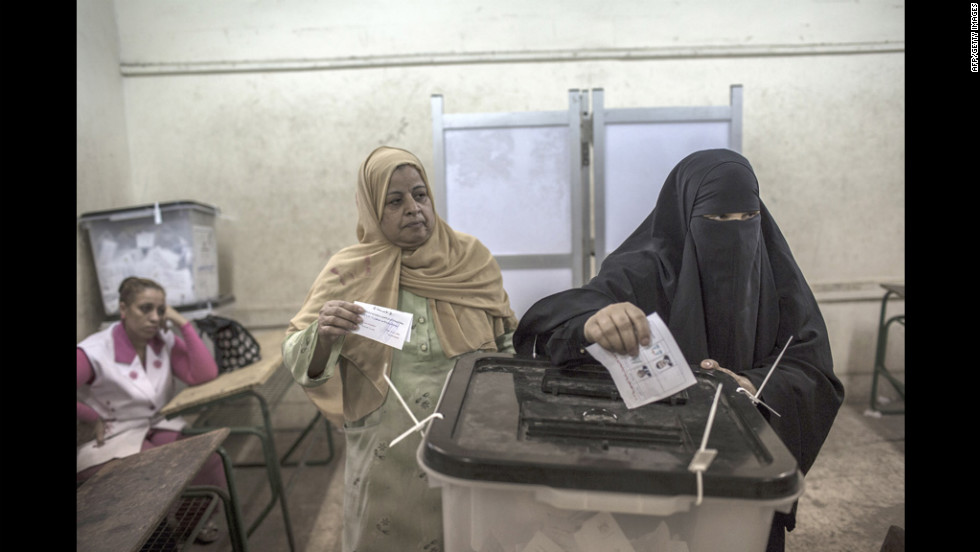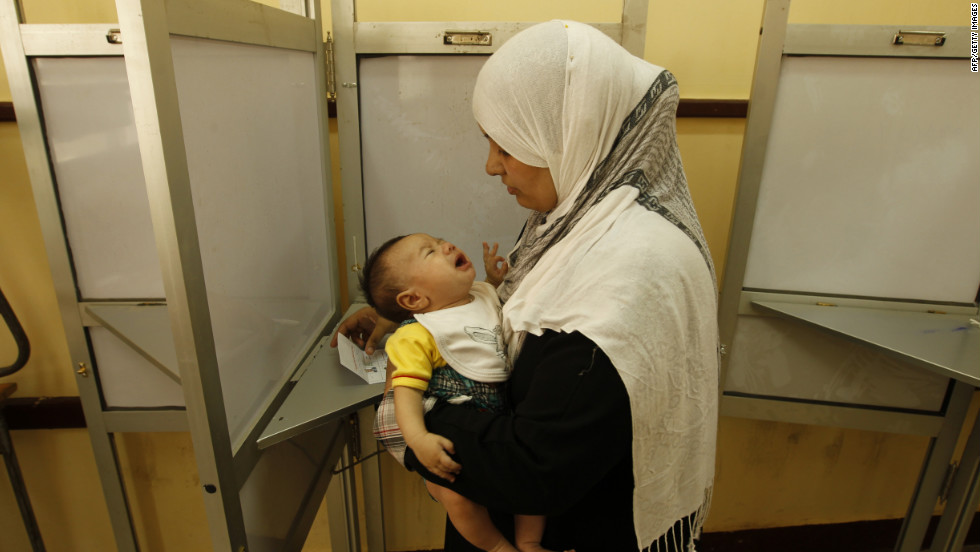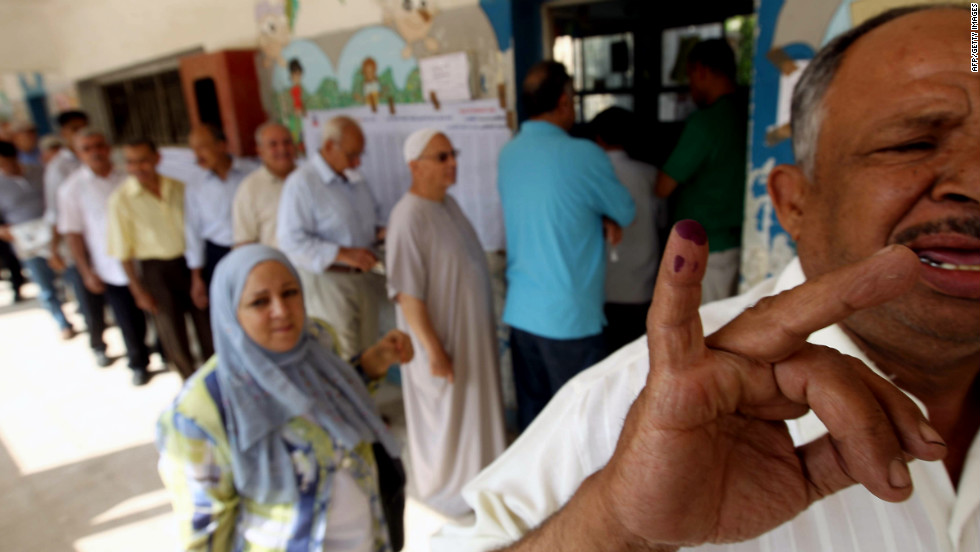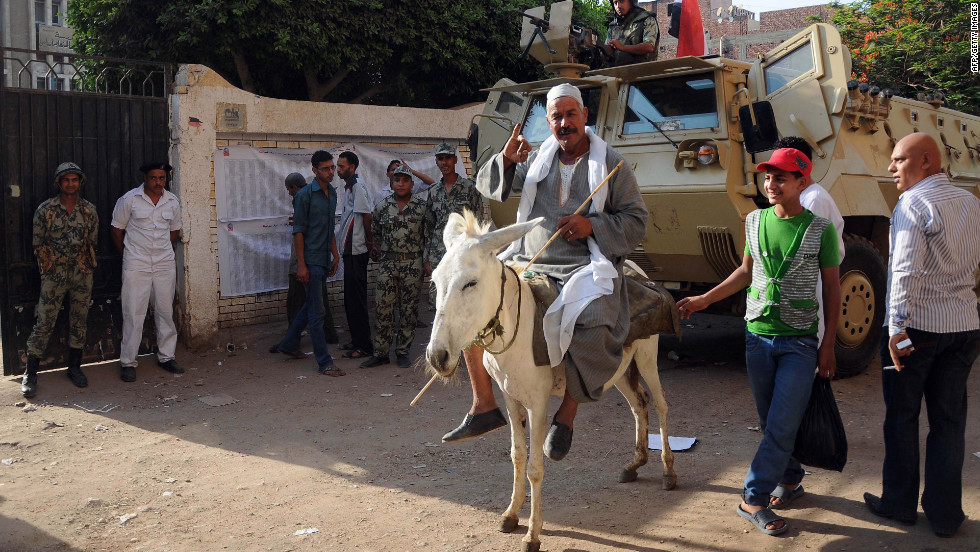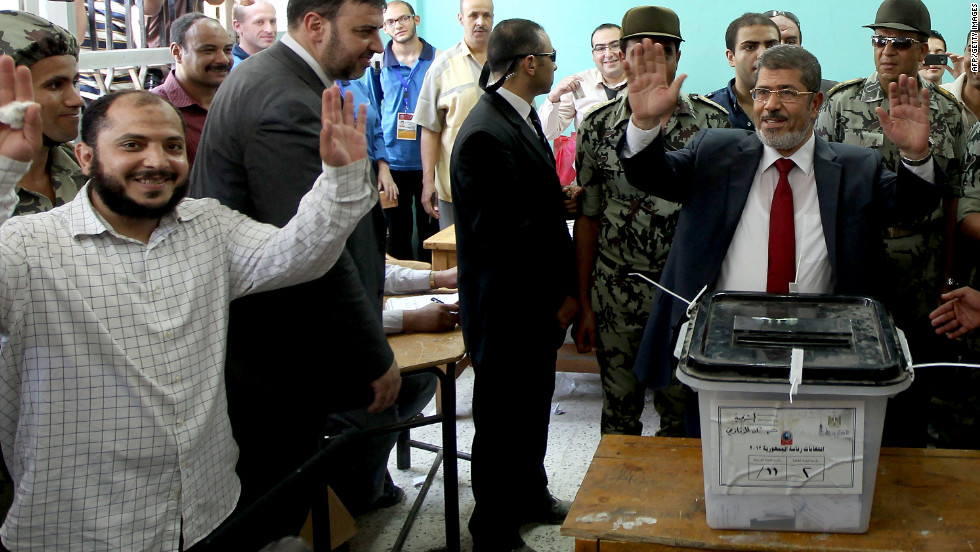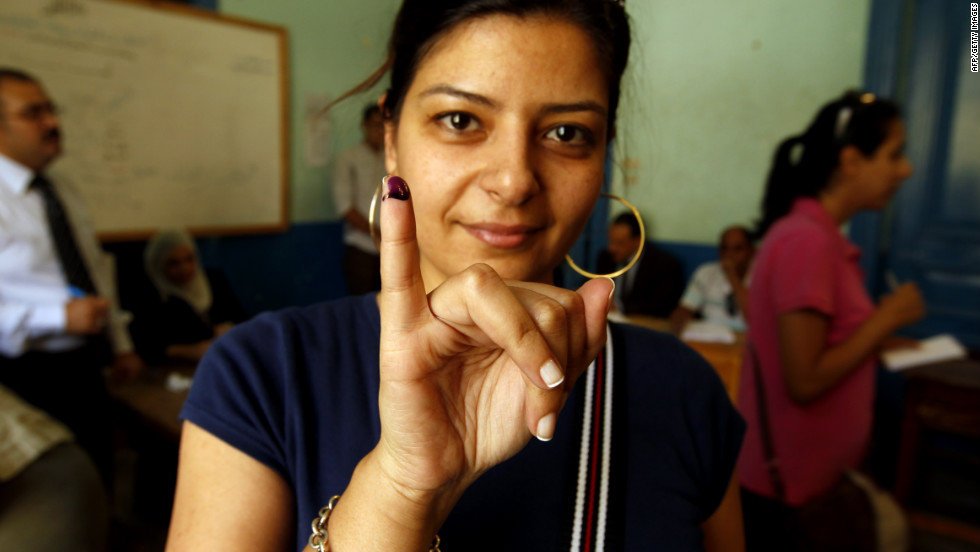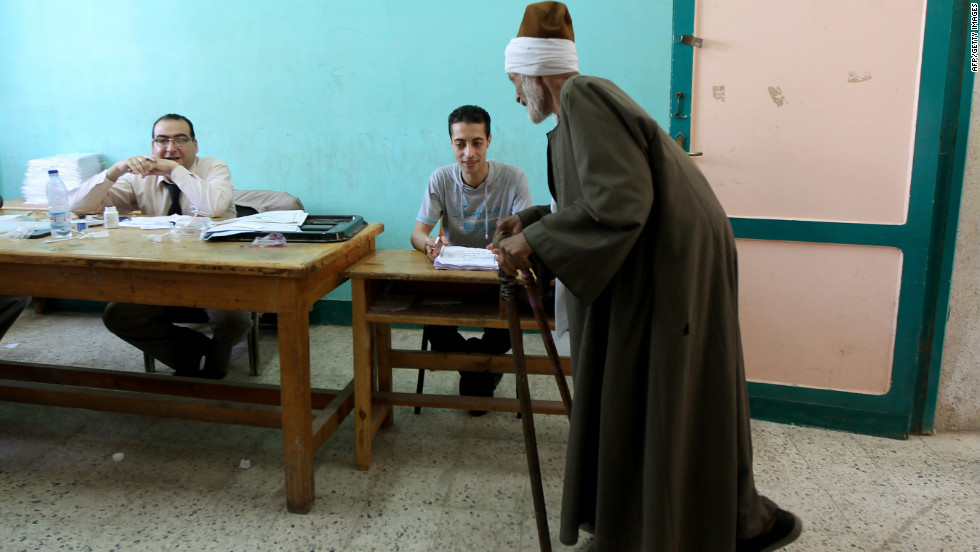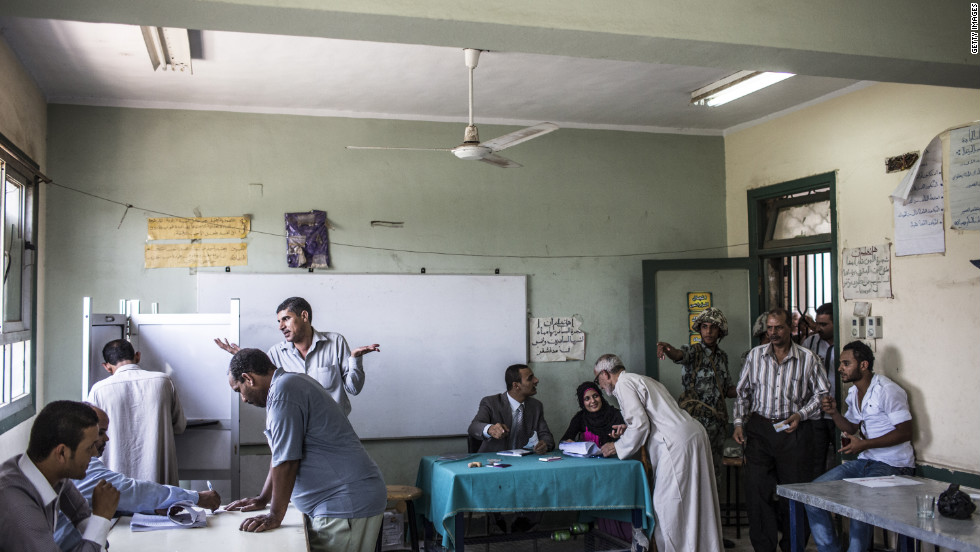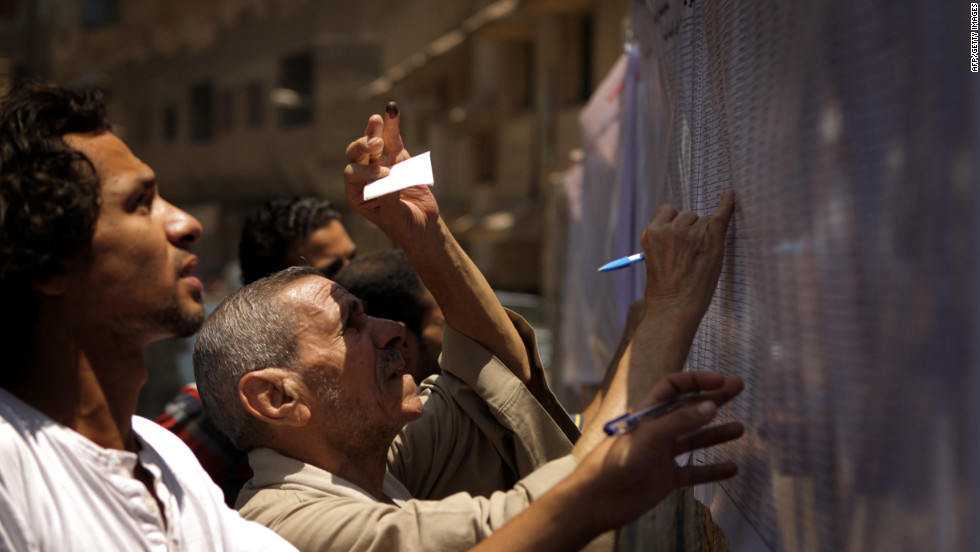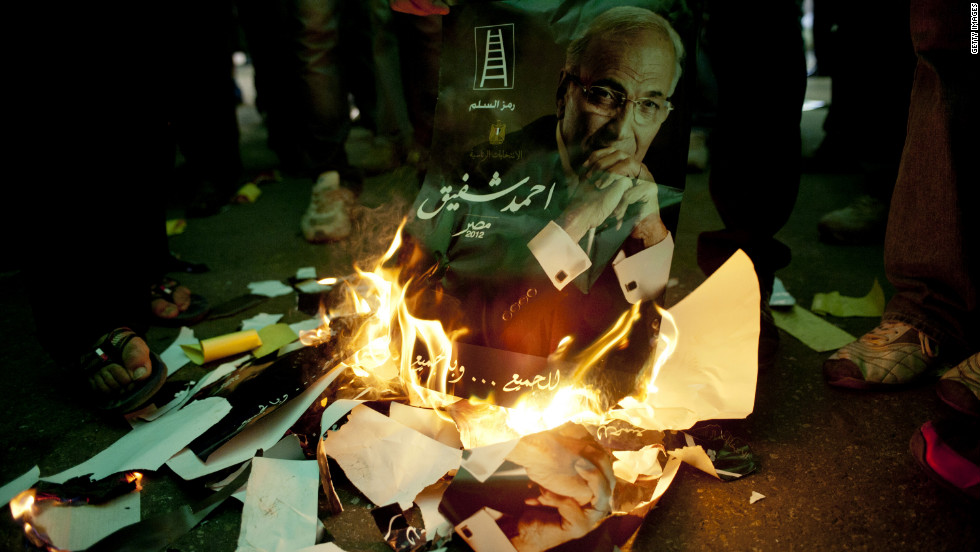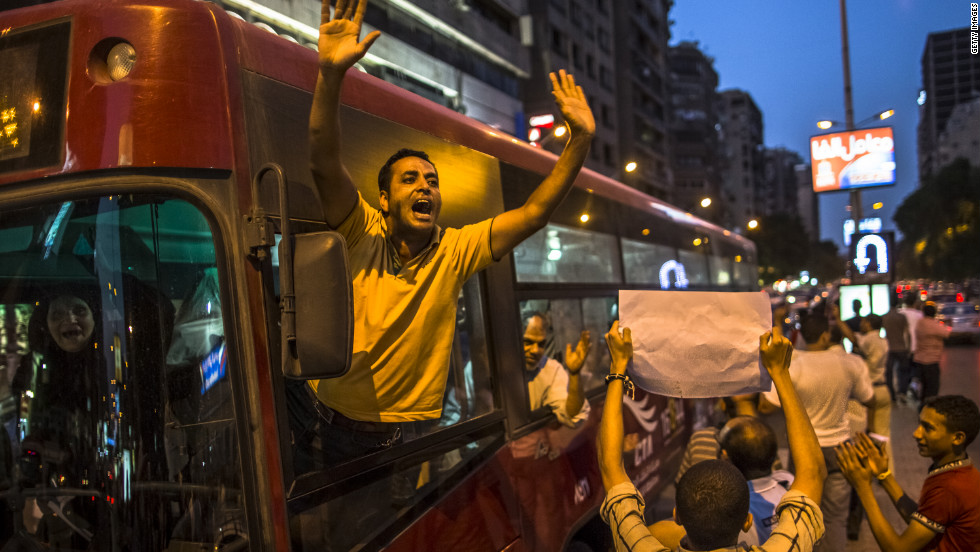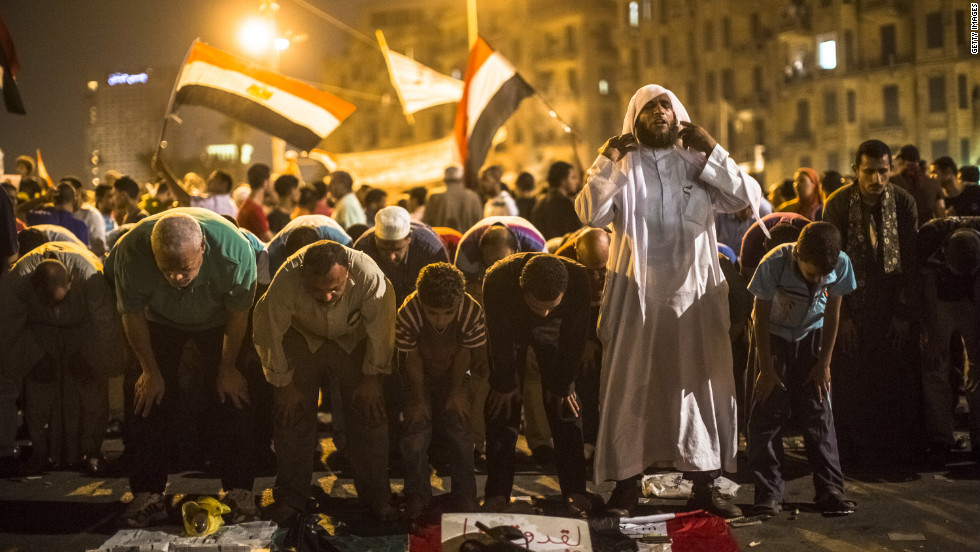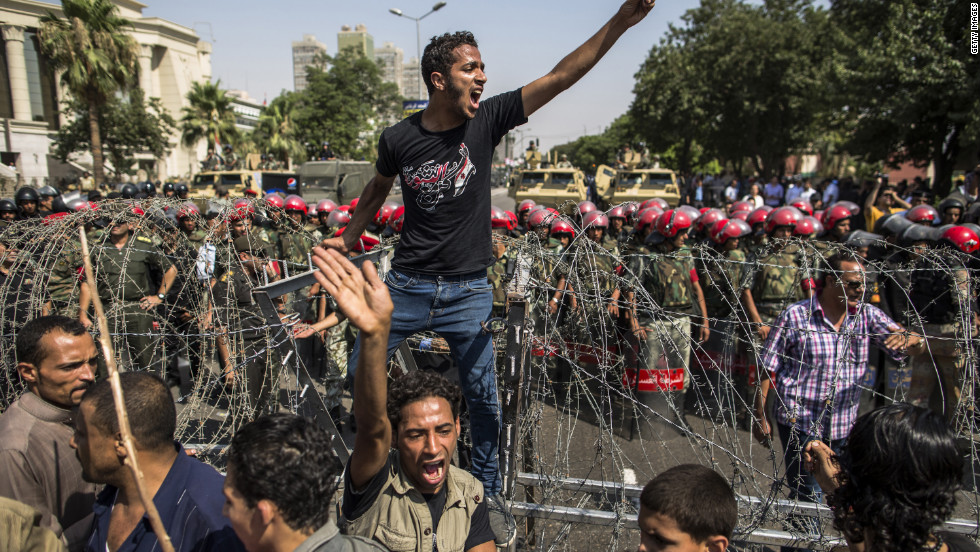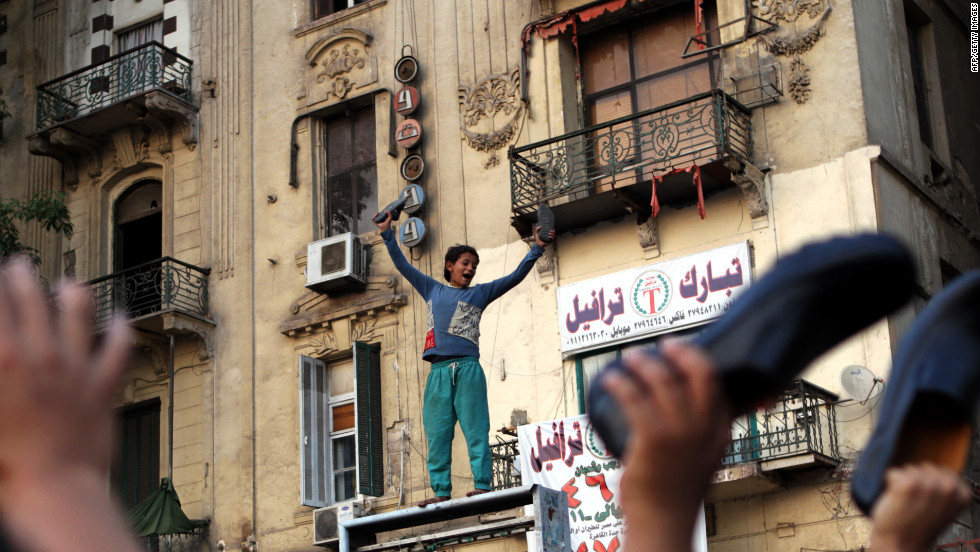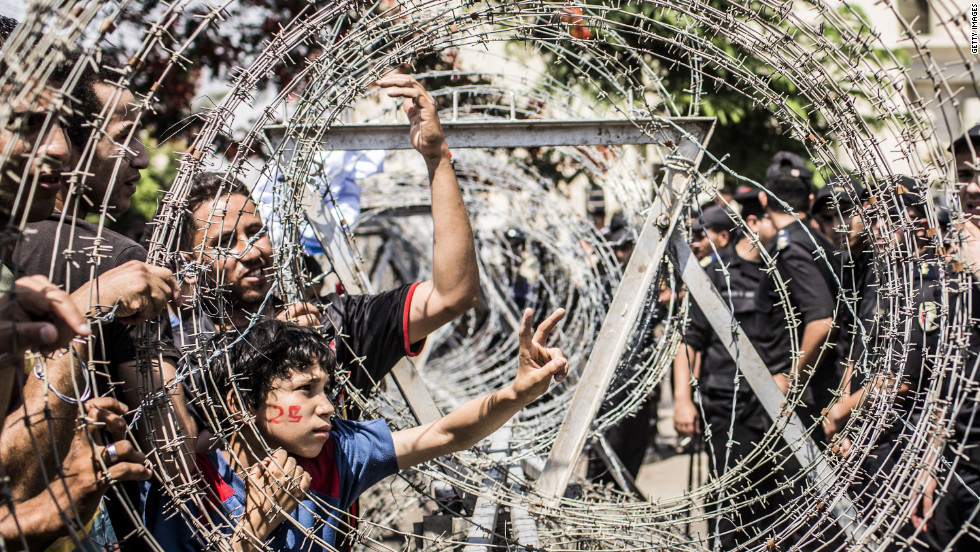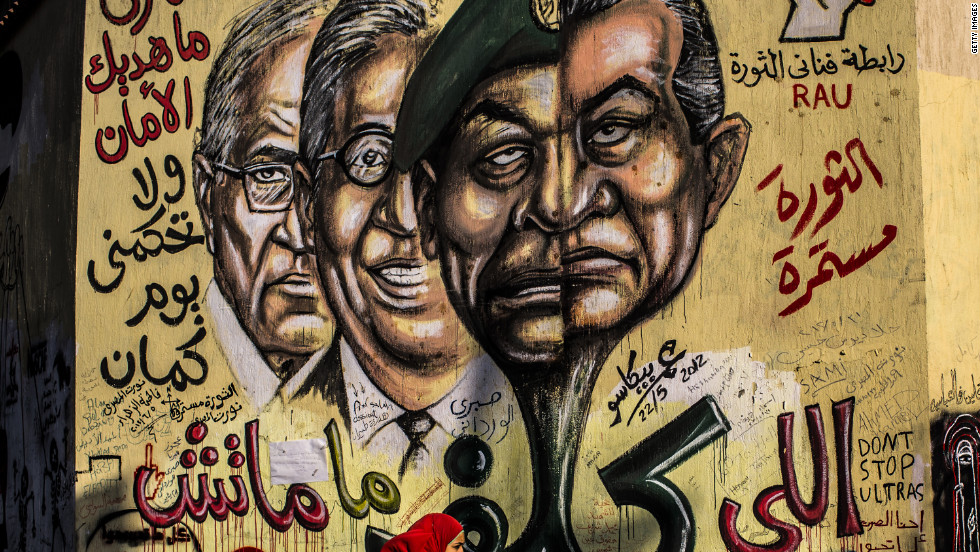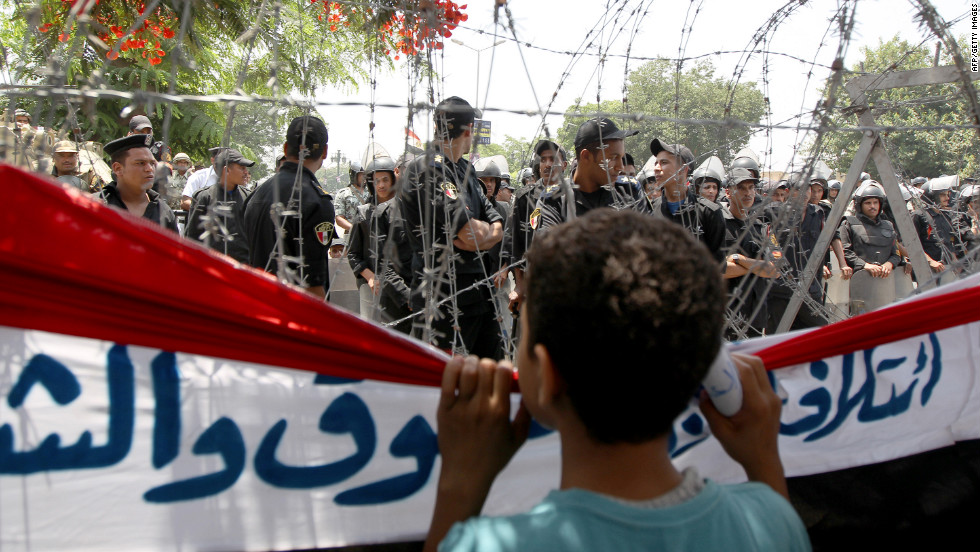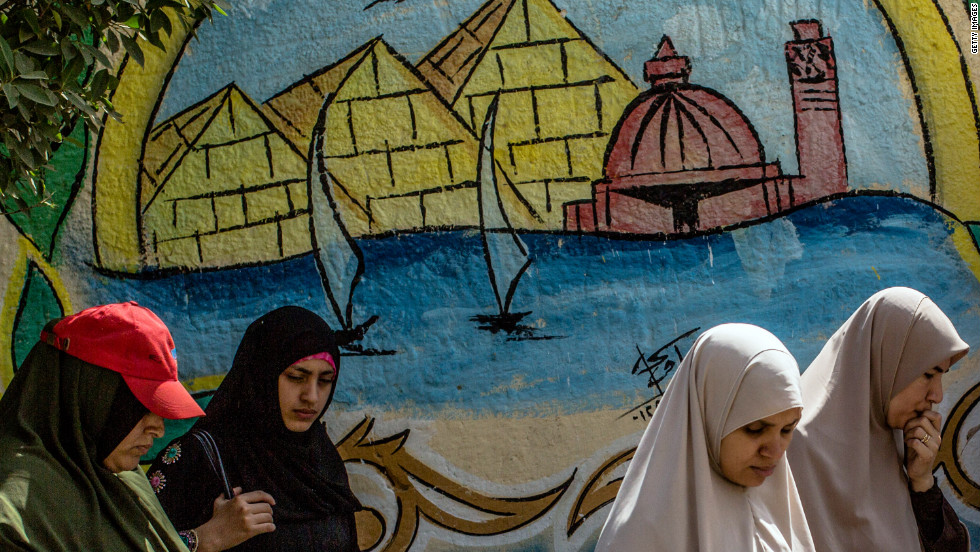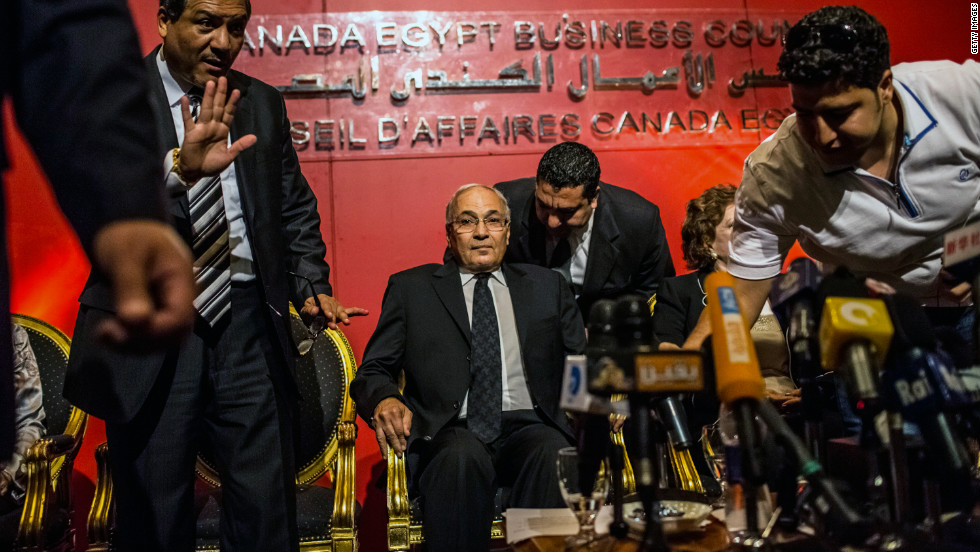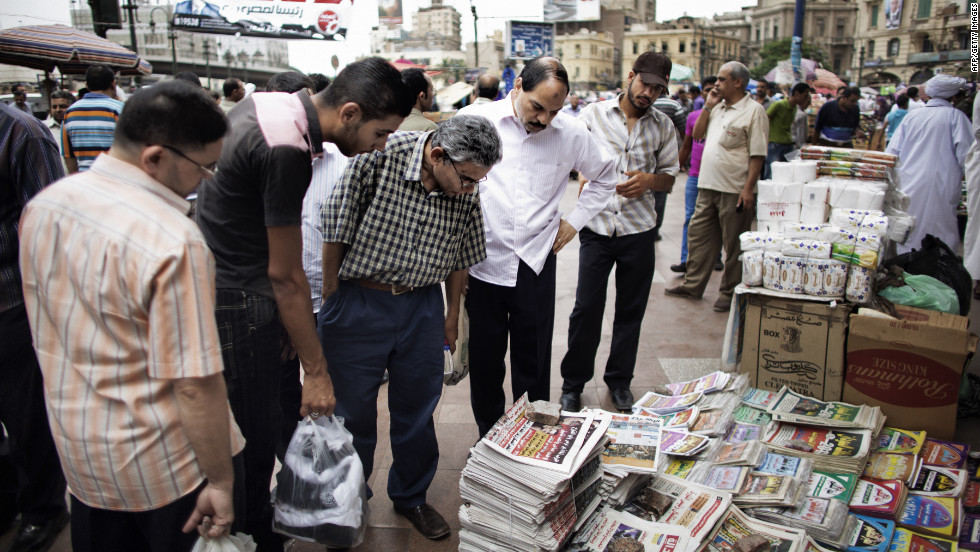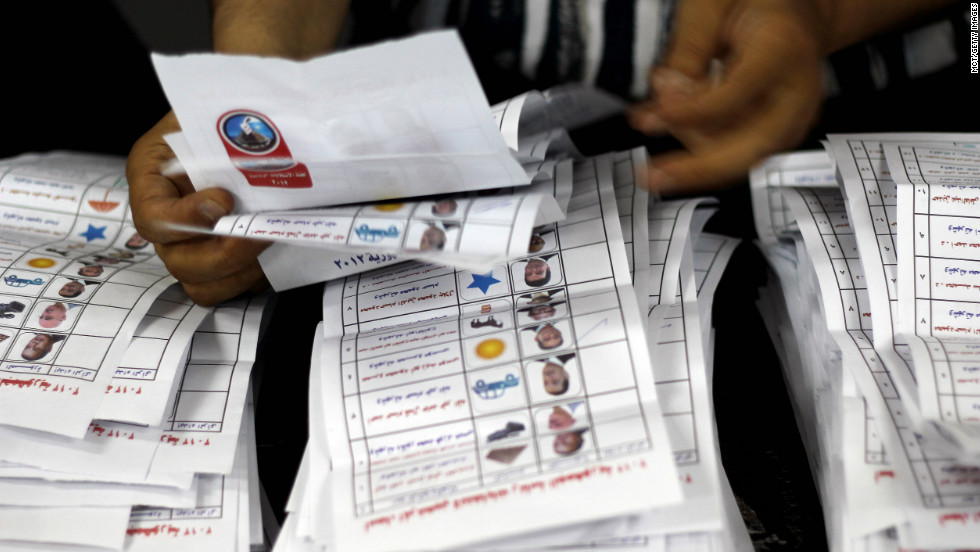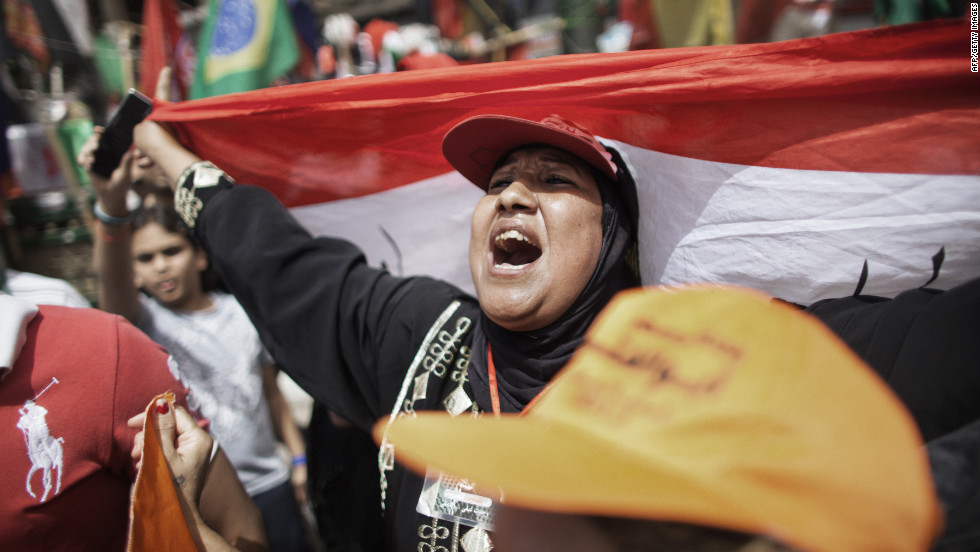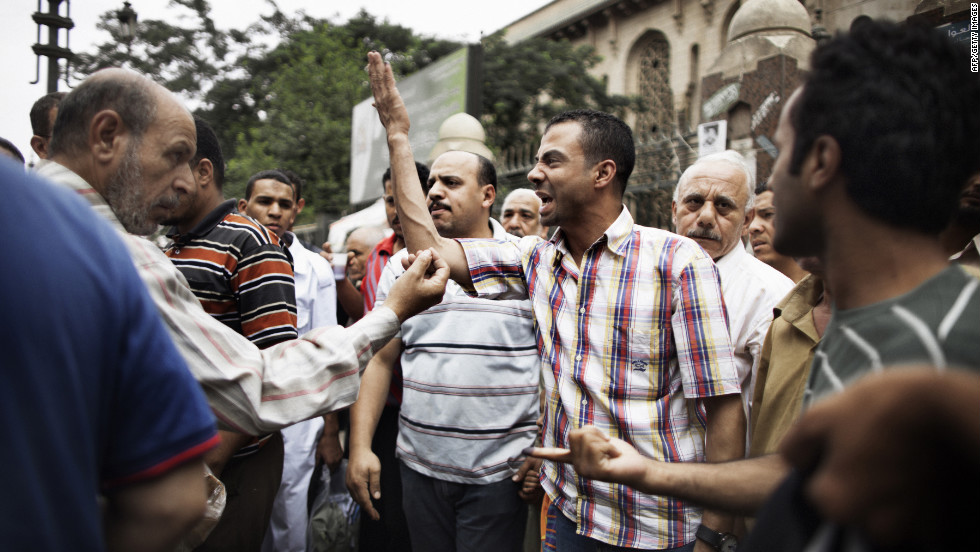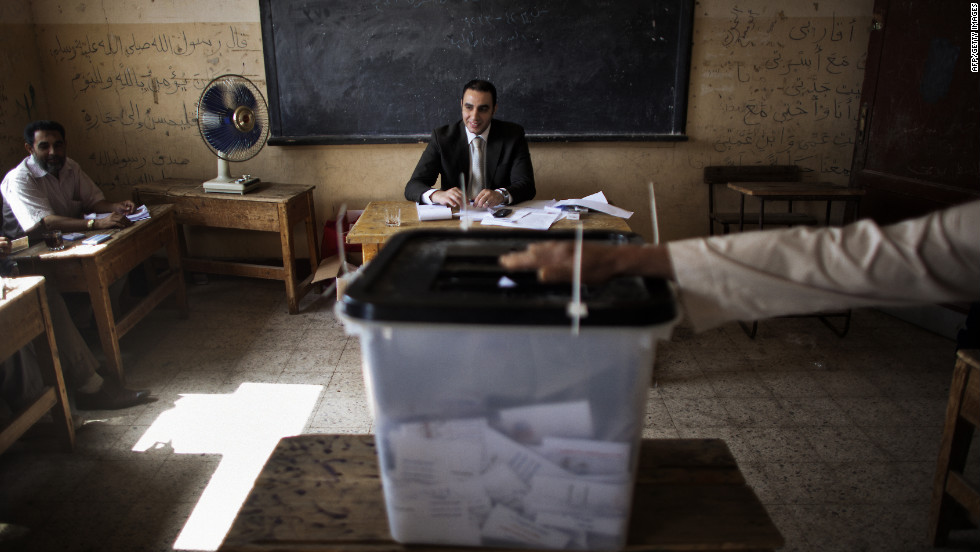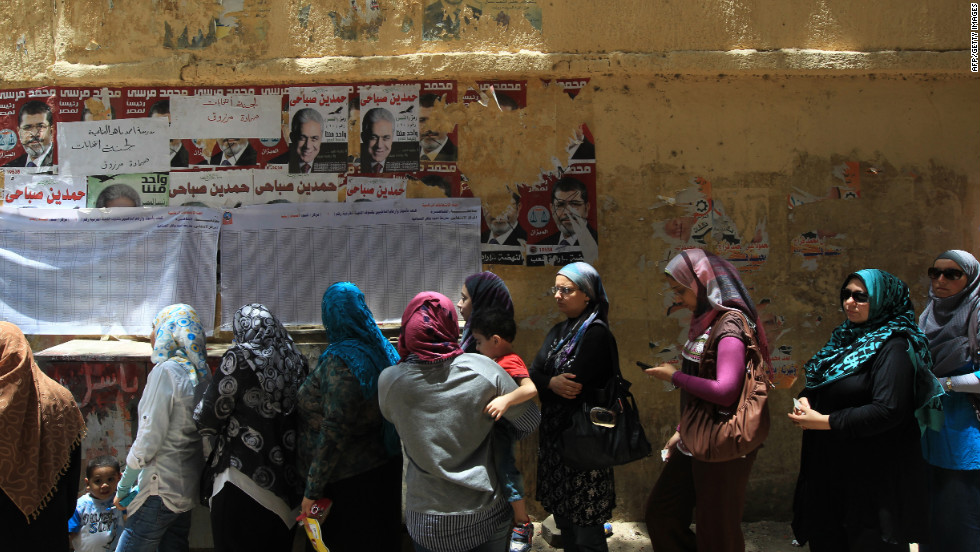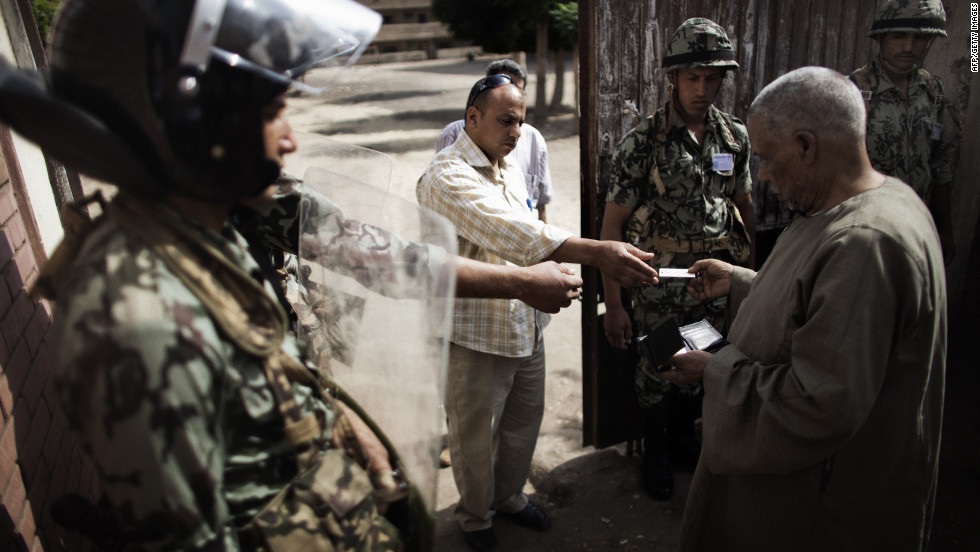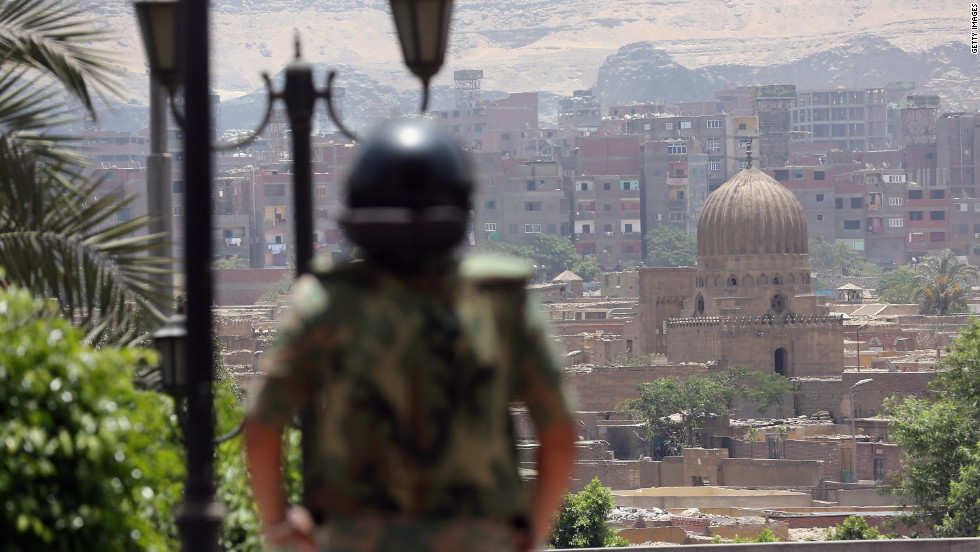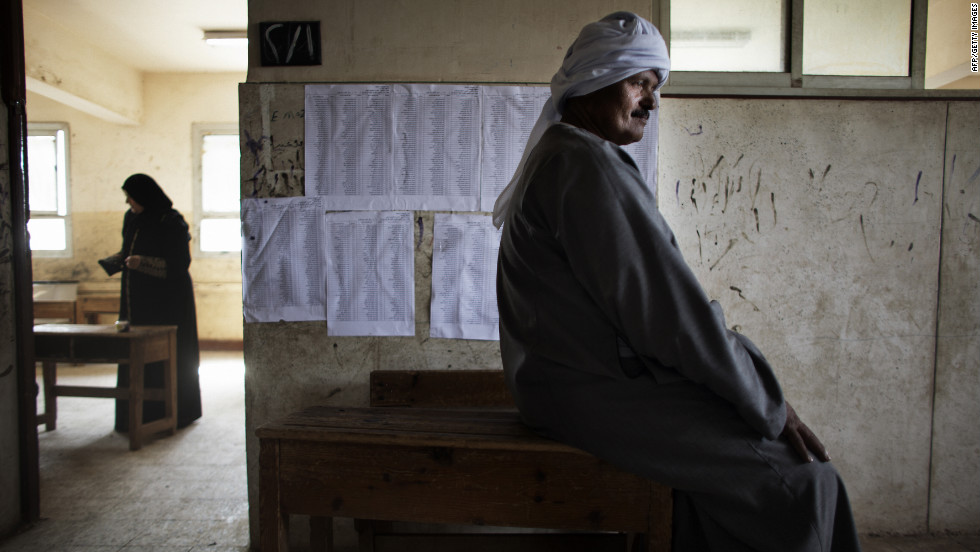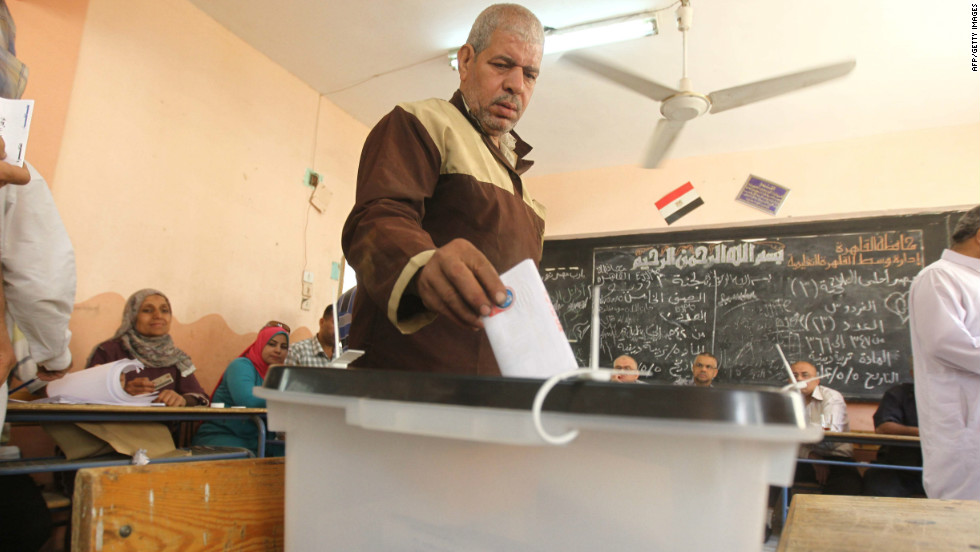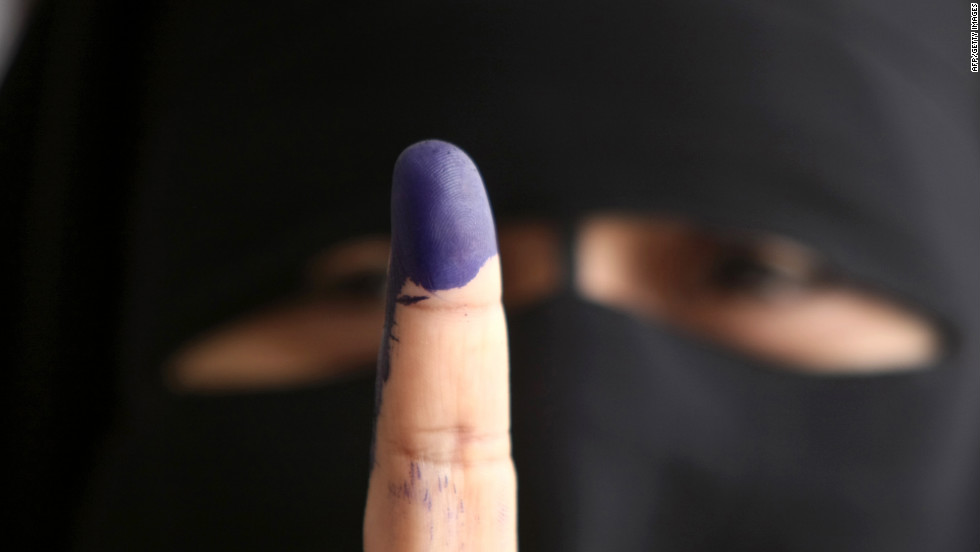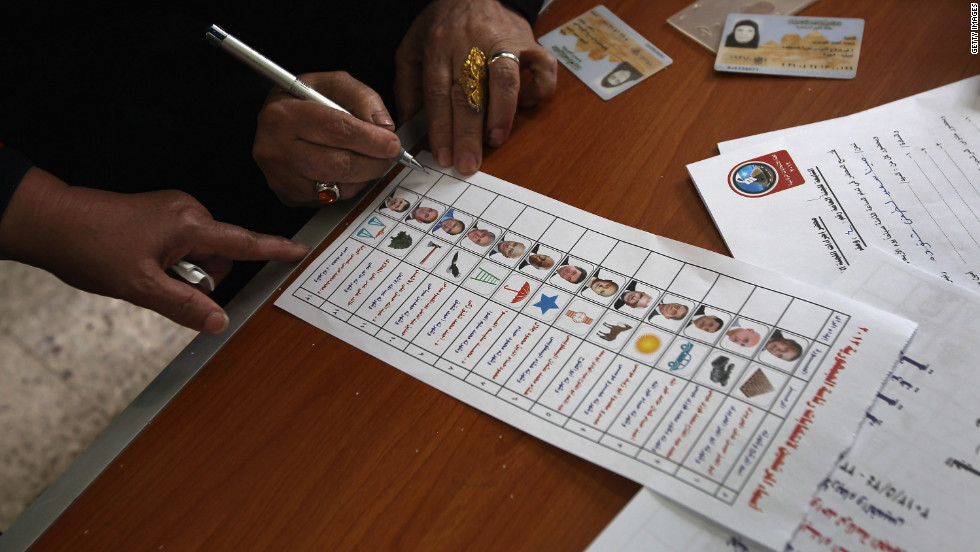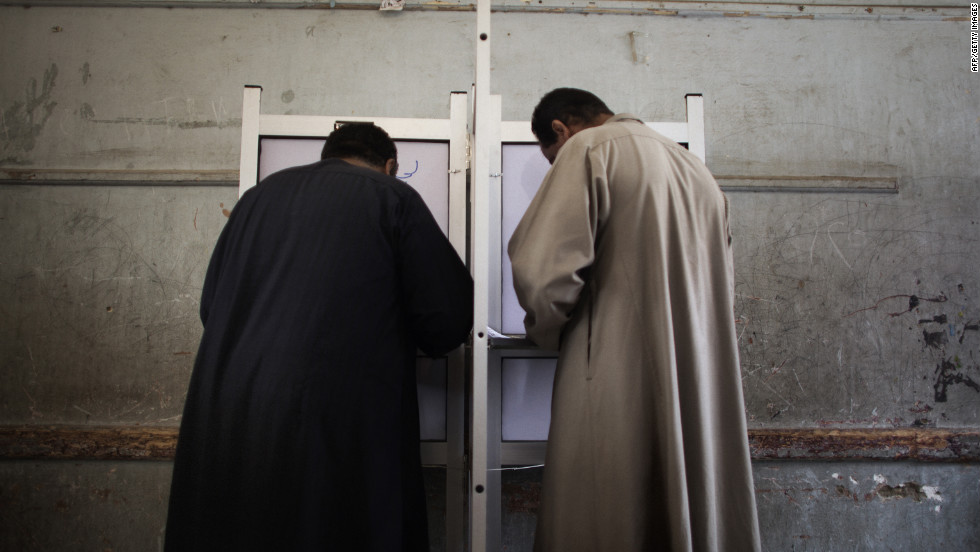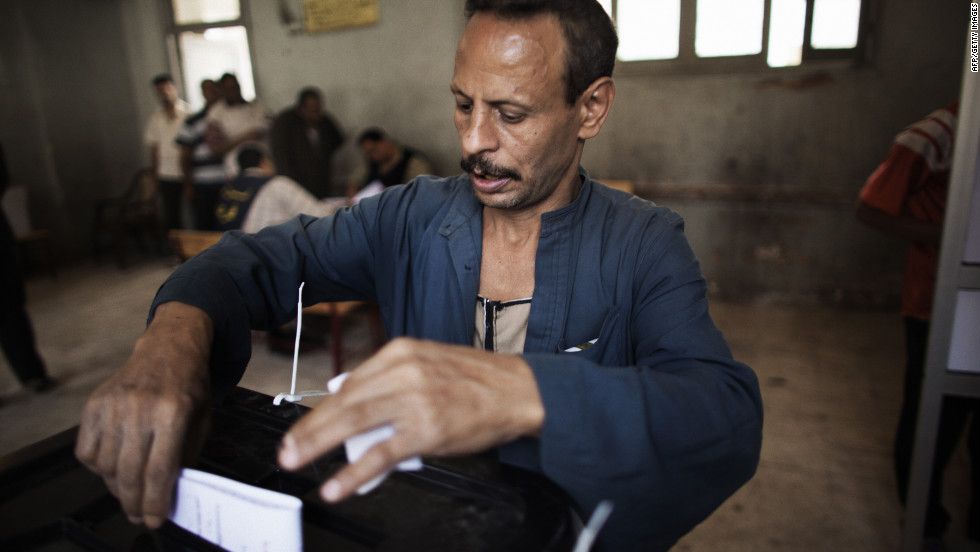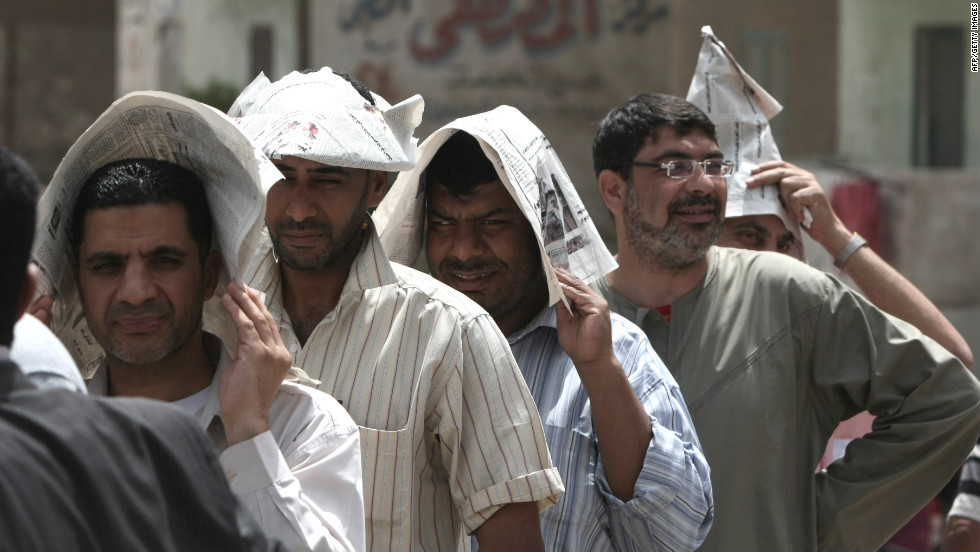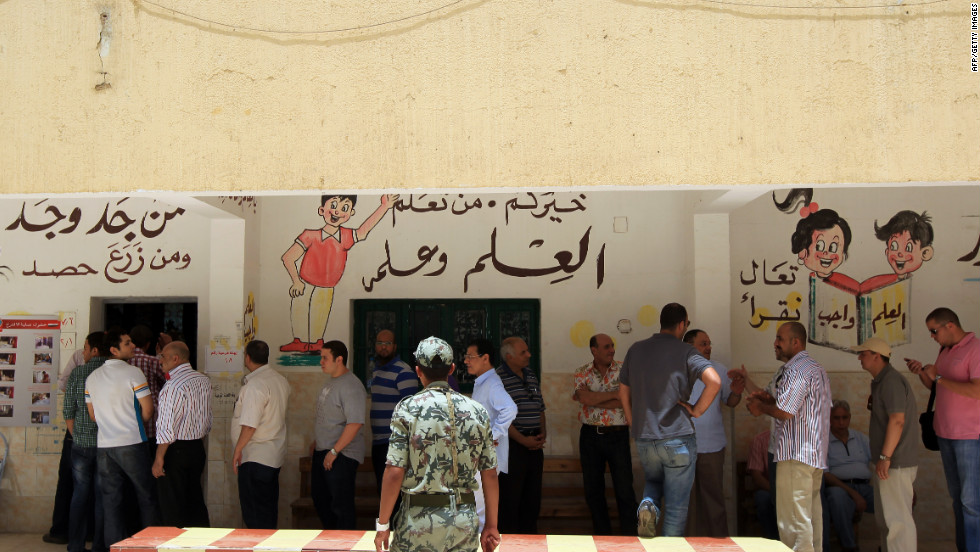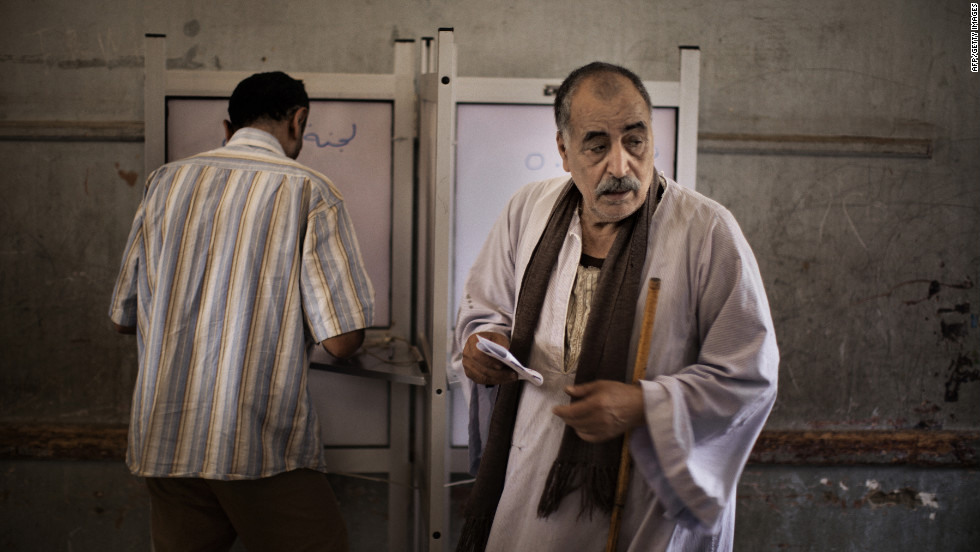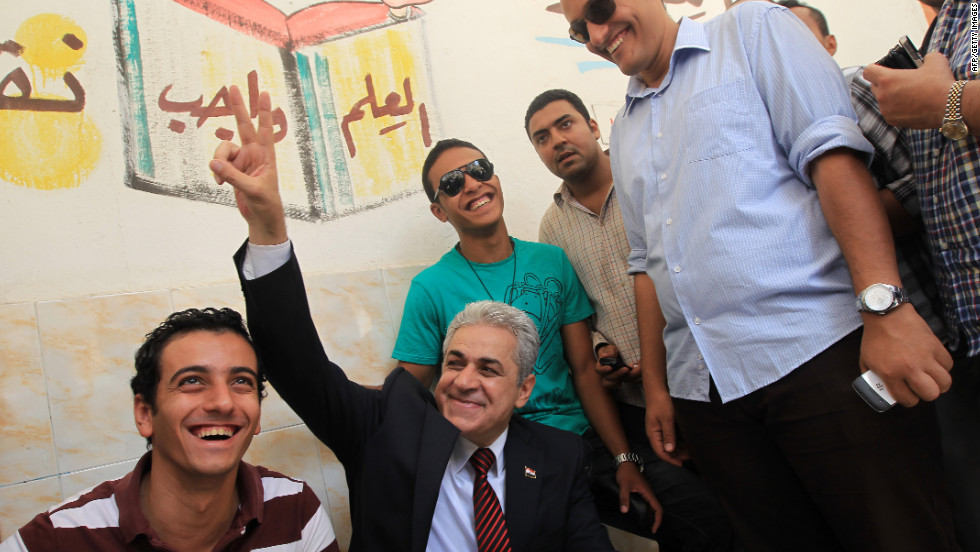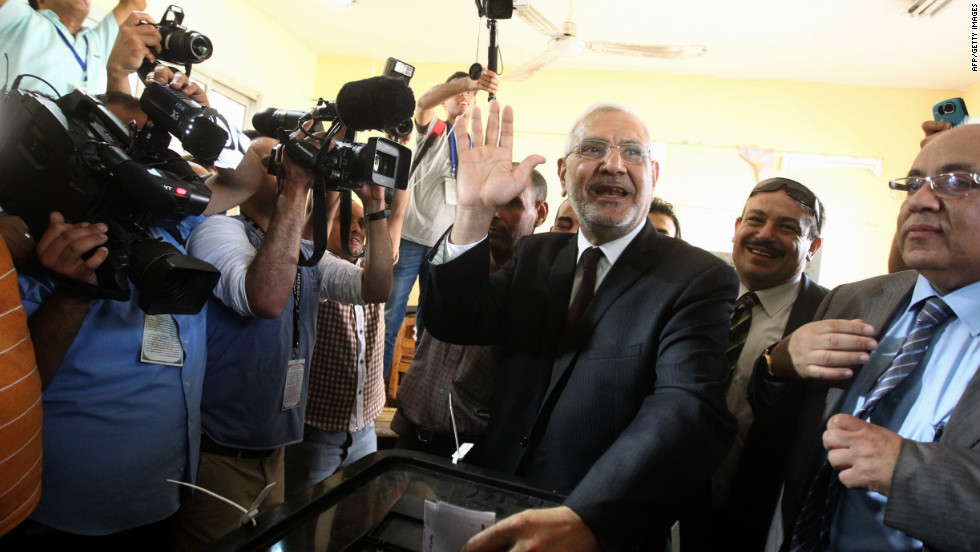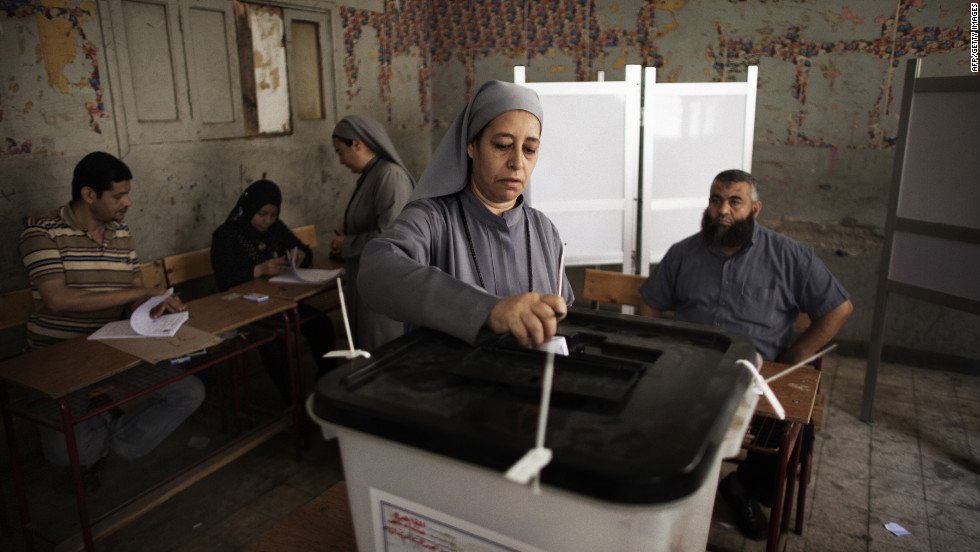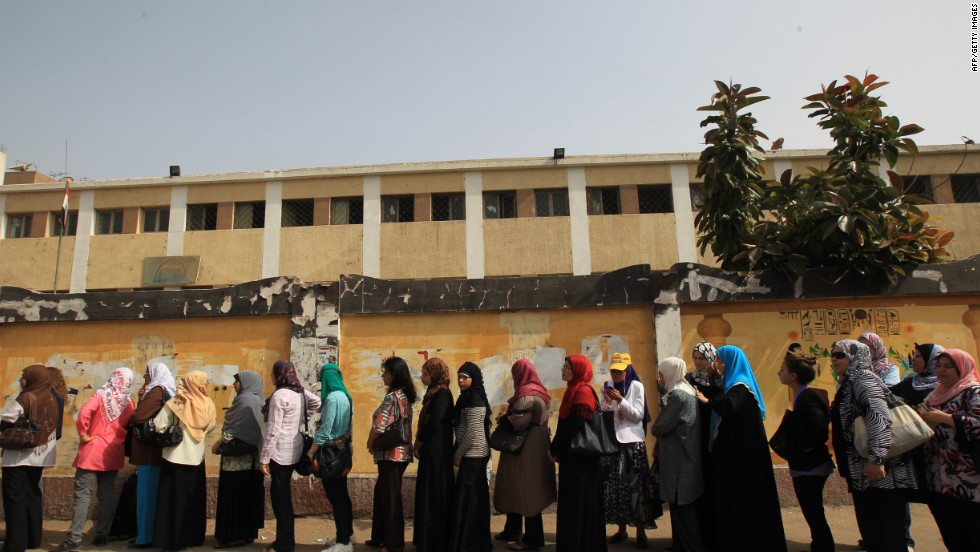Egypt's long road to presidency
Egypt's long road to presidency – Thousands of Egyptians gather in Tahrir Square after Mohamed Morsi is declared the nation's first democratically elected president on Sunday, June 24. In a nationally televised speech, the longtime member of the Muslim Brotherhood promised to represent all Egyptians.
Egypt's long road to presidency
Egypt's long road to presidency – As fireworks burst overhead, Egyptians in Tahrir Square celebrate Mohamed Morsi's election on Sunday.
Egypt's long road to presidency
Egypt's long road to presidency – A supporter of the Muslim Brotherhood is carried away from the tightly packed arena of Tahrir Square in Cairo on Sunday as Mohamed Morsi supporters celebrate his victory in Egypt's presidential election.
Egypt's long road to presidency
Egypt's long road to presidency – Morsi suppporters celebrate in front of a picture of him at his campaign headquarters in Cairo on June 24.
Egypt's long road to presidency
Egypt's long road to presidency – Supporters of presidential candidate Ahmed Shafik react after hearing the results of the presidential elections in Cairo on June 24.
Egypt's long road to presidency
Egypt's long road to presidency – Farouq Sultan, center, head of the Higher Presidential Election Commission, reads the results of the presidential runoff election in Cairo on Sunday, declaring Morsi the winner.
Egypt's long road to presidency
Egypt's long road to presidency – Muslim Brotherhood supporters cheer in Cairo's Tahrir Square on Sunday after hearing of Morsi's victory in Egypt's presidential election.
Egypt's long road to presidency
Egypt's long road to presidency – Egyptians celebrate the election of Morsi after he won 51% of the vote to defeat Shafik.
Egypt's long road to presidency
Egypt's long road to presidency – Egyptians fill Tahrir Square on Sunday, June 24, as they wait for the elections commission to announce the winner of the country's presidential election.
Egypt's long road to presidency
Egypt's long road to presidency – Female supporters of Mohamed Morsi, the Muslim Brotherhood's candidate, protest against Egypt's military rulers in Tahrir Square in Cairo on Saturday, June 23. Egyptian election officials had postponed the announcement of a winner in last weekend's presidential runoff, stating they needed more time to evaluate charges of electoral abuse that could affect who becomes the country's next president.
Egypt's long road to presidency
Egypt's long road to presidency – A supporter of presidential candidate Ahmed Shafik, the last prime minister of ousted leader Hosni Mubarak, holds up a wooden Christian cross and Muslim crescent as he and others demonstrate in Nasr city on the outskirts of Cairo, on Saturday, June 23.
Egypt's long road to presidency
Egypt's long road to presidency – The official election results are expected on June 24.
Egypt's long road to presidency
Egypt's long road to presidency – Protesters demonstrate against Egypt's military rulers.
Egypt's long road to presidency
Egypt's long road to presidency – Protesters take a break from shouting slogans to pray in Tahrir Square.
Egypt's long road to presidency
Egypt's long road to presidency – Protesters sleep as they camp overnight in Tahrir Square.
Egypt's long road to presidency
Egypt's long road to presidency – Protesters wave flags and shout slogans in Tahrir Square on Friday, June 22, in Cairo.
Egypt's long road to presidency
Egypt's long road to presidency – Crowds gather in Tahrir Square to protest against Egypt's military rulers.
Egypt's long road to presidency
Egypt's long road to presidency – Protesters shout slogans to denounce what they claim is a power grab by the ruling military, as the nation nervously awaits the results of the first post-Mubarak presidential election.
Egypt's long road to presidency
Egypt's long road to presidency – Protesters gather in front of wall art in Tahrir Square.
Egypt's long road to presidency
Egypt's long road to presidency – Protesters perform Friday noon prayer under tents erected in Cairo's landmark Tahrir Square.
Egypt's long road to presidency
Egypt's long road to presidency – Egyptian activists rest at the foot of a banner of presidential candidate Mohamed Morsi in Cairo's Tahrir Square on Thursday, June 21.
Egypt's long road to presidency
Egypt's long road to presidency – Muslim clerics join demonstrators in Cairo's Tahrir Square on Thursday to protest the delay of the presidential election results. The Presidential Election Commission postponed the release of the presidential election results, and both candidates have declared themselves winners.
Egypt's long road to presidency
Egypt's long road to presidency – A supporter of Egyptian presidential candidate Ahmed Shafik kisses a portrait of him during a Cairo rally Wednesday, June 20. Shafik was the last prime minister to serve under Hosni Mubarak
Egypt's long road to presidency
Egypt's long road to presidency – Morsi supporters rally in Cairo's Tahrir Square on Monday, June 18. Morsi declared victory as Egypt's first democratically elected president even as military rulers issued a decree that virtually stripped the position of power.
Egypt's long road to presidency
Egypt's long road to presidency – Morsi supporters wave flags Monday in Cairo's Tahrir Square after the Islamists claimed victory. The square was considered the heart of the February 2011 uprising that led to Hosni Mubarak's downfall.
Egypt's long road to presidency
Egypt's long road to presidency – The Muslim Brotherhood's Mohamed Morsi makes his way through supporters at electoral headquarters early Monday in Cairo. In a victory speech, Morsi did not address the military council's move but tried to allay fears he would impose an Islamist state.
Egypt's long road to presidency
Egypt's long road to presidency – Morsi supporters celebrate Monday in Cairo. Votes in the Egyptian capital, the largest population center, continued to be tallied, but unofficial results by a state-run news website showed Morsi leading elsewhere with 11.2 million votes, compared with 10.3 million for Ahmed Shafik, the last prime minister in the waning days of Mubarak's regime.
Egypt's long road to presidency
Egypt's long road to presidency – Egyptian election officials count ballots at a polling station in Cairo on Sunday, June 17. The official vote count was scheduled to be finished Monday.
Egypt's long road to presidency
Egypt's long road to presidency – The Muslim Brotherhood on Sunday claims its candidate, Mohamed Morsi, has defeated foe Ahmed Shafik to become Egypt's president.
Egypt's long road to presidency
Egypt's long road to presidency – An Egyptian woman shows her ink-stained finger, marking that she voted in Cairo on Sunday.
Egypt's long road to presidency
Egypt's long road to presidency – Women line up to vote at a polling station in Cairo, Egypt, on the second and final day of the run-off presidential election.
Egypt's long road to presidency
Egypt's long road to presidency – Women line-up to cast their vote at a polling station in Cairo on Sunday.
Egypt's long road to presidency
Egypt's long road to presidency – Egyptian Christian Coptic men help a woman reach a polling station in the Cairo Coptic Shubra neighborhood on Saturday, June 16. Voters returned to the polls after Egypt's Supreme Constitutional Court ruled Thursday that the Islamist-led Parliament must be immediately dissolved.
Egypt's long road to presidency
Egypt's long road to presidency – A full-veiled Egyptian woman casts her vote at a polling station in Cairo on June 16.
Egypt's long road to presidency
Egypt's long road to presidency – Egyptians queue outside a polling station in Cairo.
Egypt's long road to presidency
Egypt's long road to presidency – An Egyptian Muslim Salafist shows his ink-stained finger after voting at a polling station.
Egypt's long road to presidency
Egypt's long road to presidency – An Egyptian woman dips her finger in indelible ink after casting her ballot.
Egypt's long road to presidency
Egypt's long road to presidency – Egyptian Muslim Brotherhood candidate Mohammed Morsi, center, waves to his supporters as he arrives at a polling station to vote in the city of Zagazig.
Egypt's long road to presidency
Egypt's long road to presidency – An Egyptian woman casts her ballot in Cairo.
Egypt's long road to presidency
Egypt's long road to presidency – Egyptians check to see their names are listed before casting their votes at a polling station.
Egypt's long road to presidency
Egypt's long road to presidency – Egyptian women dip their fingers in ink after voting at a polling station.
Egypt's long road to presidency
Egypt's long road to presidency – An elderly Egyptian man shows the indelible ink stain on his finger after voting on the first day of the second round of the historical presidential election at a polling station in the city of Zagazig.
Egypt's long road to presidency
Egypt's long road to presidency – Egyptians push a truck that was blocking the entrance of a polling station.
Egypt's long road to presidency
Egypt's long road to presidency – An Egyptian man smiles after casting his vote in Giza.
Egypt's long road to presidency
Egypt's long road to presidency – A veiled Egyptian woman looks for her name on the registered voters' list in the city of Zagazig.
Egypt's long road to presidency
Egypt's long road to presidency – An Egyptian Coptic Christian woman casts her vote in the Cairo Coptic neighborhood of Shubra.
Egypt's long road to presidency
Egypt's long road to presidency – Egyptian women cast their votes at a polling station.
Egypt's long road to presidency
Egypt's long road to presidency – An Egyptian woman holds her baby as she prepares to vote at a polling station in Cairo.
Egypt's long road to presidency
Egypt's long road to presidency – An Egyptian man shows off his little finger covered in indelible ink after casting his vote at a polling station in Cairo.
Egypt's long road to presidency
Egypt's long road to presidency – An Egyptian man on his donkey shows his ink-stained finger after casting his ballot.
Egypt's long road to presidency
Egypt's long road to presidency – Muslim Brotherhood candidate Mohammed Mursi casts his ballot at a polling station in the city of Zagazig.
Egypt's long road to presidency
Egypt's long road to presidency – An Egyptian woman holds up an ink-stained finger after casting her vote at a polling station in Cairo.
Egypt's long road to presidency
Egypt's long road to presidency – An elderly Egyptian man registers Saturday before voting in the city of Zagazig in an election that pits Ahmed Shafik, the last premier of ousted President Hosni Mubarak, against Muslim Brotherhood candidate Mohammed Morsi.
Egypt's long road to presidency
Egypt's long road to presidency – Election officials and an Egyptian soldier direct voters during the second stage of runoff presidential elections at a polling station in Giza.
Egypt's long road to presidency
Egypt's long road to presidency – Egyptian Christian Coptic men check the voters' list Saturday outside a polling station in the Cairo Coptic neighborhood of Shubra.
Egypt's long road to presidency
Egypt's long road to presidency – Egyptians burn the likeness of presidential candidate and former Prime Minister Ahmed Shafik in Cairo on Friday, the eve of the nation's presidential election.
Egypt's long road to presidency
Egypt's long road to presidency – A bus driver stops to wave in support of Egyptian protesters making their way to Tahrir Square on Thursday.
Egypt's long road to presidency
Egypt's long road to presidency – Egyptians pray in Tahrir Square on Thursday during a protest against presidential candidate Ahmed Shafik.
Egypt's long road to presidency
Egypt's long road to presidency – A protester stands on a barricade of barbed wire as Egyptian military police stand guard. Egypt's Supreme Constitutional Court ruled that the Islamist-led parliament must be immediately dissolved.
Egypt's long road to presidency
Egypt's long road to presidency – An Egyptian boy waves his shoes as he joins supporters of the Muslim Brotherhood in a protest in Cairo's Tahrir Square against Mubarak-era prime minister and presidential candidate Ahmed Shafik after Egypt's top court rejected on Thursday a law barring him from standing in a tense presidential poll runoff.
Egypt's long road to presidency
Egypt's long road to presidency – Protestors gesture towards military police through a barricade of barbed wire during a protest against presidential candidate Ahmed Shafik outside the Supreme Constitutional Court on Thursday.
Egypt's long road to presidency
Egypt's long road to presidency – People walk past graffiti showing faces of ousted Egyptian president Hosni Mubarak, right; Field Marshal Hussein Tantawi, second right; former Secretary General of the Arab League Amr Mussa, second left, and former prime minister and presidential candidate Ahmed Shafiq, left, at Tahrir square.
Egypt's long road to presidency
Egypt's long road to presidency – A boy peers through barbed wire at Egyptian military police standing guard outside the Constitutional Court in Cairo on Thursday, June 14.
Egypt's long road to presidency
Egypt's long road to presidency – Egyptian women line up to cast their vote Saturday.
Egypt's long road to presidency
Egypt's long road to presidency – Former Prime Minister Ahmed Shafiq, center, is seated before addressing a business conference in Cairo on Wednesday.
Egypt's long road to presidency
Egypt's long road to presidency – Egyptians read the front page of newspapers for sale outside of Al-Fatah Mosque in Cairo on Friday, May 25.
Egypt's long road to presidency
Egypt's long road to presidency – Ballots are counted by election officials in Alexandria as the country eagerly awaits the outcome Friday.
Egypt's long road to presidency
Egypt's long road to presidency – A supporter of presidential candidate Abdelmonen Abol Fotoh voices her opinions at Tahrir Square on Friday.
Egypt's long road to presidency
Egypt's long road to presidency – Supporters of various candidates debate outside Al-Fatah Mosque in Cairo on Friday.
Egypt's long road to presidency
Egypt's long road to presidency – Electoral officials monitor voting in Namul, a village north of Cairo, on Thursday, May 24, the second and final day of voting in Egypt's historic presidential election. Egypt is holding its first presidential election since last year's toppling of Hosni Mubarak, part of the wave of Arab Spring uprisings.
Egypt's long road to presidency
Egypt's long road to presidency – Egyptian women wait in line Thursday to cast their vote outside a polling station in Cairo. If no candidate gets a majority of the vote in the first round of voting, a second round will be held June 16-17.
Egypt's long road to presidency
Political uncertainty in Egypt – An election worker checks the identification of a voter at a polling place Thursday in Namul as Egyptian soldiers stand guard.
Egypt's long road to presidency
Egypt's long road to presidency – A soldier stands watch in the Egyptian capital on the second day of voting. A pervasive fear exists that the powerful military, which has run the country since Mubarak's fall 16 months ago, could try to hijack the election.
Egypt's long road to presidency
Egypt's long road to presidency – An Egyptian man waits to cast his ballot Thursday north of Cairo. The vote is considered Egypt's first free and fair presidential election in modern history.
Egypt's long road to presidency
Egypt's long road to presidency – An Egyptian man drops off his ballot at a polling station Thursday in Cairo. The voting marks the first time Egypt has held a presidential election in which the results aren't known beforehand.
Egypt's long road to presidency
Egypt's long road to presidency – An Egyptian woman holds up an ink-stained finger after casting her ballot in Cairo on Wednesday, May 23, the first day of voting in the historic election.
Egypt's long road to presidency
Egypt's long road to presidency – A voter studies her ballot Wednesday in Cairo. Thirteen candidates are competing in the wide-open race, but two withdrew after ballots were printed.
Egypt's long road to presidency
Egypt's long road to presidency – Egyptian men fill out their ballots Wednesday in Cairo. Results of the first round of voting are not expected before the weekend.
Egypt's long road to presidency
Egypt's long road to presidency – An Egyptian man casts his ballot at a Cairo polling station. Some Egyptians told CNN that they waited up to four hours Wednesday to vote.
Egypt's long road to presidency
Egypt's long road to presidency – Egyptian men shield themselves from the hot sun outside a Cairo polling station Wednesday.
Egypt's long road to presidency
Egypt's long road to presidency – Egyptian men line up to cast their vote Wednesday in Cairo. Some 30,000 volunteers fanned out to ensure voting is fair, said organizers with the April 6 youth movement, which has campaigned for greater democracy in Egypt.
Egypt's long road to presidency
Egypt's long road to presidency – Egyptian men fill out their ballots at a Cairo polling place.
Egypt's long road to presidency
Egypt's long road to presidency – Presidential candidate Hamdeen Sabahy, a leftist dark-horse contender, flashes a sign of victory as he waits to vote at a Cairo school.
Egypt's long road to presidency
Egypt's long road to presidency – Presidential candidate Abdelmonen Abol Fotoh, a moderate Islamist, casts his ballot Wednesday in Cairo.
Egypt's long road to presidency
Egypt's long road to presidency – An Egyptian Coptic nun drops her ballot at a Cairo polling station Wednesday.
Egypt's long road to presidency
Egypt's long road to presidency – Egyptian women wait outside a polling station in Cairo. Many Egyptians seem uncertain of their loyalties to any particular candidate.
